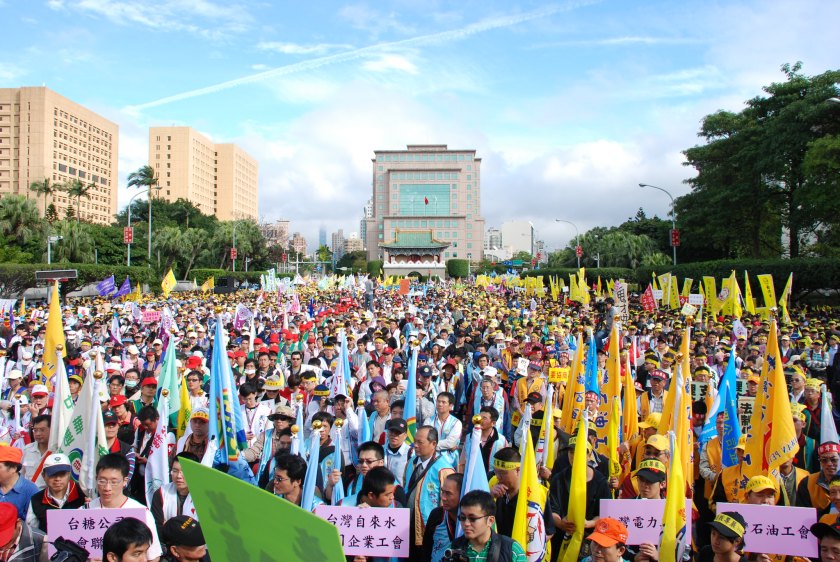[Taiwan Labor Action Coalition in Response to Tariff Impact] Press Interview Notice
100 Days of Waiting, Workers Ignored while Tariff Crisis Worsens
Mobilize Nationwide Unions Mobilize, Urging Executive Yuan Premier to Address Labor Concerns
Since U.S. President Donald Trump announced global tariffs in early April, nearly half a million domestic jobs have been affected—yet the government hasn’t offered a meaningful response. Concerned about workers’ rights being overlooked in trade talks, labor advocates formed the Taiwan Labor Action Coalition on Tariff Impact (the Alliance) in June. The group has repeatedly asked to meet with government officials, but so far, the administration has remained silent.
With trade negotiations showing little promise for Taiwan, workers from the nation's most vulnerable industries—machine tools, automotive parts and assembly, and precision engineering—plan to stage a large-scale protest on Tuesday, July 22. Surrounding the Executive Yuan and holding rice bowls as a symbol of job security, they will call on the Premier to confront labor concerns directly. The Alliance has also invited legislators from major political parties to join the protest and publicly clarify their positions ahead of the upcoming recall vote and potential by-election.
Key speakers at the protest include representatives from the machinery and automotive sectors, voicing concerns about threats to their industries and urging the government to stop ignoring workers’ demands. Meanwhile, a youth group will stage a symbolic performance outside the Executive Yuan to spotlight how workers’ rights are being treated as bargaining chips.
The Alliance demands a senior representative from the Executive Yuan—at minimum the Secretary-General—should engage in direct dialogue with workers on site, and a firm commitment that labor rights will not be compromised in any trade agreement. Otherwise, the Alliance pledges to lead workers from across Taiwan into the Executive Yuan to directly seek answers from Premier Cho.
Time: July 22, 10:00 a.m
Location:. Main Gate, Executive Yuan
Press Contacts:
Chen Po-Chien — Researcher, The Alliance
Wu Hui-Ling — Secretary-General, Taiwan Professional Machinery Labor Union
Liu Sheng-Ming — Deputy Chair, Taoyuan Federation of Labor
[Clinic Accused of Labor Violations—Unions Call for Legal Action and Compensation for Nurses]
The Kaohsiung Independent Federation of Unions joined hands with allied unions today to defend the dignity and rights of Taiwan’s nurses.
Together with the Taiwan Nurses Unions, the Taiwan Federation of Medical Unions, and other labor allies, we gathered outside AiBi GaoRong YuRen Clinic to stand in solidarity with nurses who’ve faced exploitation and retaliation.
The clinic has long engaged in unlawful practices, including using a pooled working hours system to offset overtime and avoid paying overtime wages, enforcing excessive shift schedules, underreporting salaries for labor insurance, and imposing inflated penalties or withholding pay upon contract termination.
At today’s press conference, unions exposed over a dozen labor law violations and detailed the unpaid overtime amounts. Former nurses courageously shared their personal experiences, drawing public attention to the mistreatment and injustices faced by healthcare workers. To highlight the damage caused by these exploitative timekeeping systems, union members staged a street performance calling on the clinic’s leadership to:
- Immediately withdraw the unjust lawsuits against its nurses
- Repay all outstanding wages and overtime
- Review and reform its employment practices
- Restore a respectful, secure workplace for all nursing staff
The Kaohsiung Independent Federation of Unions firmly believes that only through unity and action can workers’ rights be protected. We’re grateful for the support of fellow unions today. On the road to justice, we are never alone.
[Taiwan Labor Action Coalition in Response to Tariff Impact]
- Tariff Negotiation Period Nears End; Labor Alliance Demands Transparency
- Taiwan Workers Demand Jobs, Reject Symbolic Compensation
- Union Warns of Action if Labor Rights Undermined
With the US tariff deadline fast approaching, Taiwan government continues to project “constructive progress” while avoid addressing potential impact to domestic labor. Workers remain excluded from negotiations, even as independent analyses warn that final U.S. tariff rates could reach 15–20%, threatening thousands of jobs.
The Taiwan Labor Action Coalition in Response to Tariff Impact, formed June 17 and backed by over 100 unions, is calling out the government’s secrecy and inaction. The group warns that unless job security is clearly safeguarded, workers will mobilize nationwide and surround the Executive Yuan, demanding direct dialogue with the Premier.
Small and medium enterprises have also voiced frustration, revealing they too are kept in the dark. This widespread information gap, the alliance argues, highlights the government’s troubling stand on closed-door negotiations.
“Workers want jobs—not post-layoff subsidies,” the alliance declared. “Vocational training and re-employment schemes miss the point. What we need is a government commitment to protect employment in current industries, not vague promises of career transitions.”
The Alliance issues three demands:
1. No deals without direct consultation with labor representatives.
2. Full rejection of any compensation schemes based on job losses.
3. Concrete guarantees that workers can stay in their existing industries.
Time is running out. Taiwan’s workers will not be treated as expendable.
[Taiwan Labor Action Coalition in Response to Tariff Impact] Press Conference
This morning, the Taiwan Labor Action Coalition in Response to Tariff Impact held a press conference, urging the government to hold open negotiations and protect workers' rights.
"Reject backroom deals—unions must be involved!" they declared.
If the government fails to respond, workers will take to the streets to fight for their livelihoods and job security.
https://www.facebook.com/watch/?v=750266250755358&rdid=mmupmazPKUIPTvGz
https://www.youtube.com/watch?v=hflqCpX63XU
https://www.youtube.com/watch?v=j9b-kAfaDNs
https://www.chinatimes.com/....../20250617002065......
https://www.taisounds.com/news/content/76/196407
https://www.taipeitimes.com/News/taiwan/archives/2025/06/18/2003838820
Tariff Shock Threatens 500,000 Workers—Cross-Industry Unions Unite to Demand Transparency and Representation
In response to U.S. President Trump’s global tariff plan announced in early April—which includes a proposed 32% tariff on Taiwanese goods—Taiwan’s major unions warn that the impact could jeopardize over 500,000 workers’ rights and livelihoods across key industries in Taiwan.
While other governments engage unions in policy discussions, Taiwan's labor groups have been excluded from ongoing negotiations with the U.S., raising fears that workers may be sacrificed as bargaining chips. The Ministry of Labor’s recent outreach has focused only on job training and post-crisis resettlement—offering no concrete measures for protection, only what unions call “planning for the funeral before the fall.”
In response, five national union coalitions—representing over 50 grassroots unions—have formed the Taiwan Labor Action Coalition in Response to Tariff Impact and officially launched on June 17 at Taiwan’s Legislative Yuan.
Their message to the government: “No more backroom deals. Include labor in the talks.” If the government fails to respond, the coalition will mobilize affected workers and their families to the streets.
Press Conference Details:
June 17, 2025, 9:00 AM – Legislative Yuan, Red Building Room 301
Speakers:
- Duan Weizhong, President, Taiwan Machinery Industry Labor Union
- Chen Ruolan, Chair, Taoyuan City General Union
- Wang Qinghong, Chair, Kaohsiung Independent Federation of Union
- Ruan Youting, Chair, National Federation of Independent Trade Unions
- Dai Guorong, Chair, Taiwan Confederation of Trade Union
- Cai Shengmu, Chair, Vehicle Committee, Intl. Metalworkers’ Federation of Taiwan
Taiwan Network Union: Honghua Co. Posts NT$18.5 Billion in Revenue, Yet Grants a Meager NT$600 Pay Raise!
The Union Urges Honghua to Do Right by Its Employees—Fair Pay Is the Way Forward!
Chunghwa Telecom subsidiary Honghua International Co., Ltd. promotes itself as a "happy enterprise", boasting seven consecutive awards, including the 2024 CSEA Excellence in Customer Service Award. At its year-end party, the company proudly announced an impressive NT$18.5 billion revenue, celebrating employees' dedication and hard work. Expecting a salary increase comparable to Chunghwa Telecom’s parent company—NT$4,000 raise and a NT$20,000 bonus—employees were stunned to learn their 2025 salary adjustment amounted to just NT$600.
Despite the company’s push for performance-driven cooperation, this meager increase undermines employee contributions, damages morale, and leaves workers feeling betrayed.
Hsu Fu-Li, Chairman of the Taiwan Network Union, stated: "Honghua International, a wholly-owned subsidiary of Chunghwa Telecom with NT$180 million in capital, serves as the company’s frontline for customer service—including retail, maintenance, and call centers. Honghua operates under increasingly demanding performance targets, with KPI requirements doubling annually. Despite these challenges, Honghua’s employees continue to excel, driving exceptional results. Their contributions have significantly reduced Chunghwa Telecom’s labor costs while making a substantial, undeniable impact on its earnings per share (EPS).
Union Vice Chairman Chiu Hsiao-Tung stated that at Honghua’s 2024 year-end party, the company proudly announced a NT$18.5 billion revenue—100 times its capital—with growth across all performance indicators. Not only did it meet targets, but 70% of its revenue was recognized by parent company Chunghwa Telecom, contributing to its NT$4.8 EPS in 2024. Yet, despite employees’ dedication in achieving these results, Honghua’s reluctance to fairly compensate them is deeply disappointing.
Union Secretary-General Qiu Wen-Hsia revealed that since January 2025, Chunghwa Telecom employees have received a NT$4,000 monthly pay raise and a NT$20,000 bonus. Meanwhile, Honghua employees—who handle customer service, retail, and repair work—were given a mere NT$600 increase. As living costs soar, many employees face financial strain. Despite Chunghwa Telecom’s emphasis on ESG and CSR, it has failed to uphold its corporate responsibility to support young workers, instead exploiting its subsidiary’s employees. To deflect scrutiny, Chunghwa Telecom claims financial independence from Honghua. Yet, the chairman is appointed by Chunghwa, and KPI targets are dictated by the parent company, suggesting complete subordination to Chunghwa’s directives. Despite this, Honghua employees continue to receive lower salaries, weaker bonuses, and poorer working conditions compared to their counterparts at Chunghwa Telecom.
The union chairman emphasized that as a US-listed company through ADRs, Chunghwa Telecom must uphold ESG principles. Its annual shareholder reports repeatedly affirm its commitment to labor rights, stakeholder interests, and corporate social responsibility. We urge Chunghwa Telecom to acknowledge Honghua International as its subsidiary and reconsider its salary increase policy amid inflation and the 4% raise standard for government entities. The union recommends that, effective retroactively from January 2025, Honghua employees receive a NT$3,000 salary increase and a one-time NT$15,000 bonus—a necessary step to fairly reward employees, retain talent, and foster long-term success for shareholders, workers, and customers alike.
Press Contact: Taiwan Network Union
Chairman Hsu Fu-Li 0937332666
Secretary-General Qiu Wen-Hsia 0937332882
E-mail: tnu0501@gmail.com
Website: http://tnu.org.tw
Joint Press Release [Fighting an Unethical Employer]
Kaohsiung Sheng-Li Elementary School Principal Li Jin-Shi Faces Fines, Lawsuits Amid Power Abuse and Union Suppression Allegations
Sheng-Li Elementary School Principal Li Jin-Shi is accused of power abuse, staff retaliation, union suppression, and illegal parking. He's lost multiple lawsuits, prompting the Kaohsiung Education Union and others to demand accountability for his unethical conduct and disregard for public order:
Retaliation Against Whistleblowers
Principal Li reportedly retaliated against those who exposed his actions. A cashier who testified in court before the Ministry of Labor was immediately hit with a poor performance review and falsely accused of absenteeism. Similarly, after filing a lawsuit against National Federation of Education Unions Secretary-General Liu Ya-Ping, Principal Li targeted the local union chair for testifying, penalizing them with an unjust assessment.
Union Suppression and Fine Evasion
Principal Li actively obstructed union operations, refusing to deduct union dues from salaries and violating labor laws. This led the Ministry of Labor to rule that he had committed two unfair labor practices, levying fines totaling NT$200,000. Despite the clear ruling, he attempted to evade payment through administrative litigation. His appeal was rejected, his request for suspension of the penalty denied, and his final appeal ultimately dismissed.
Six Lawsuits Lost Against Teachers and Parents
Principal Li's legal troubles also involved teachers and parents. He allegedly interfered in the school's parent association election, and when parents reported his behavior, he retaliated by suing them for defamation. He lost that case, and his request for reconsideration was dismissed. Additionally, his defamation lawsuits against labor leaders Liu Ya-Ping and He Geng-Xu were all rejected, with his subsequent appeals dismissed by the High Prosecutors’ Office.
National Scandal Over Misused Disabled Parking
Principal Li directly violated disability rights laws by illegally taking over parking spaces designated for disabled individuals. He went so far as to remove the markings from a reserved spot just to park there himself. This blatant disrespect for public order has been widely reported by media, making it a significant national scandal.
Issued By / Media Contact:
Kaohsiung Education Union: Chairperson Li Hsien-Neng
Jointly Issued By:
National Federation of Education Unions: Chairperson Lin Shuo-Chieh
Kaohsiung Confederation of Trade Unions: Chairperson Lin Shun-Chi
Kaohsiung Independent Federation of Union: Chairperson Wang Ching-Hung
https://www.facebook.com/share/p/19EkbRL7MN/
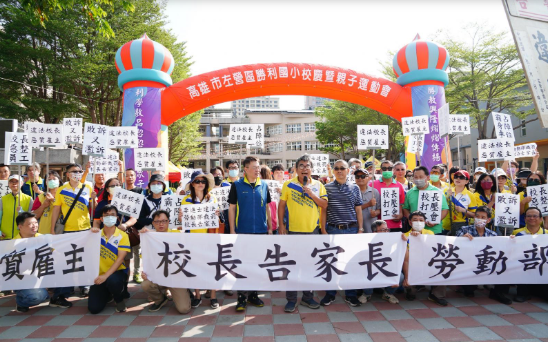
May Day Labor Rally on Ketagalan Boulevard "Anti Bullying, Demand Protection"
At the 2025 May Day Labor Rally, the Kaohsiung Independent Federation of Union joined forces with the Taiwan Medical Workers' Union to champion critical issues facing healthcare workers nationwide. Their advocacy focused on addressing low wages, severe staff shortages, high nurse-to-patient ratios, and the push to convert fixed-term employment contracts to indefinite terms.
The unions urged Minister of Health and Welfare Chiu Tai-Yuan and President Lai Ching-Te to honor their pre-election commitments, calling for an end to broken promises and voter deception. They also demanded that the Ministry of Transportation address employment contract issues for seafarers in China Steel Express and across Taiwan, pushing for a transition from fixed-term contracts to indefinite employment to safeguard workers from exploitative shipping companies.
Our Key Demands:
- No More Bullying! Protect Our Rights!
- Less Work, More Life! Restore Our Holidays!
- End Elder Poverty! Secure Our Retirement!
- Fight Inflation! Raise Our Wages!
- Stop Discrimination! Strengthen Labor Power!
- Staff Up Healthcare & Education! Protect Professionals!
- Fair Transitions Now! Labor Has a Voice!
#Kaohsiung Independent Federation of Union
#Taiwan Federation of Medical Unions
#China Steel Express Union
#Kaohsiung Medical University Labor Union
#Zuoying Armed Forces General Hospital Union
https://news.tvbs.com.tw/life/2856999
https://www.youtube.com/watch?v=hJ2s26QeIHQ
https://search.app/SUAAJksCtYqsASHJ8
https://youtu.be/IQCa5eeDtu4?si=nYOYn3jbZE1ig2_L
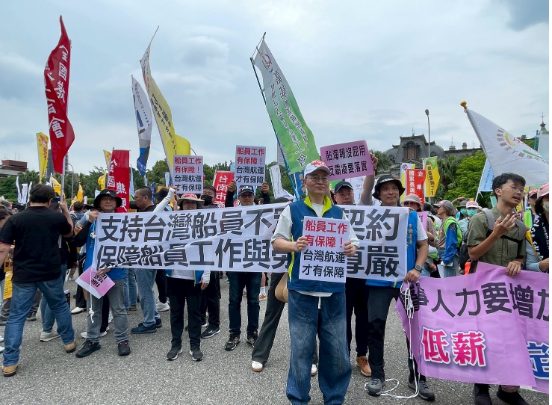
Repost: China Steel Express Union Alleges Misconduct in Chinese Seamen's Union Elections
The China Steel Express Union has received complaints from members of the Chinese Seamen’s Union regarding irregularities in the recent union representative election, held from April 15 to April 29. Members reported that company representatives closely monitored the voting process, with supervisors overseeing polling stations and pressuring crew members to vote for company-backed candidates. Many seafarers expressed frustration, stating that such interference violated the fundamental principle of secret ballots, which is essential for fair elections.
Further concerns have arisen regarding the election's integrity. Reports indicate that after ballots were cast, election officials allegedly hired temporary staff and IT personnel to collect voters' personal data. Daily records, including members' ID numbers, names, and union credentials, were reportedly uploaded to a Google Drive cloud file without consent, making them accessible to election personnel. This unauthorized practice deviates from announced election procedures, raising serious privacy and election integrity concerns. Given the sensitive nature of voter information, the election registry should have been sealed post-election. The collection and storage of voter data without authorization may violate the Personal Data Protection Act and cast doubt on the fairness of the election.
The act of uploading union members' private information to Google Drive without explicit consent contradicts contractual agreements and governance regulations, potentially violating Article 20 of the Personal Data Protection Act. As violations of this law are subject to public prosecution, the China Steel Express Union has taken formal action by sending a legal notice as evidence. We urge relevant authorities to intervene and rectify the situation, ensuring a fair and lawful election process for the Chinese Seamen’s Union. Moreover, we call on specific shipping companies to relinquish control over union affairs and allow seafarers to regain their rightful representation, reaffirming the union’s original mission of safeguarding and advocating for Taiwan’s maritime workforce.
[China Steel Express Union] Hundreds of Crews and Families Rally Around CSC Building with Vehicles
[China Steel Express Union Interview Notice 11-27-2024]
No Progress on Employment Rights Protection and Reinstatement of Labor and Health Insurance!
Calling for Hundreds of Seafarers and Families with Vehicles to Surround CSC Building
Since July this year, China Steel Express (CSE), a 100% subsidiary of state-owned China Steel Corporation (CSC), has abruptly cut off labor and health insurance for hundreds of Taiwanese seafarers waiting for reassignments onshore. Additionally, the company delays the reassignment of Taiwanese seafarers while prioritizing Chinese seafarers. These actions jeopardize the work rights and livelihoods of Taiwanese seafarers and their families.
To defend these rights, the union has obtained the first legal strike right for seafarers in Taiwan’s maritime history and mobilized hundreds of seafarers and their families to protest at the Ministry of Labor in October, demanding the then-Minister Ho Peishan resolve these issues. The union has vowed to continue its protests if no action is taken.
Despite a recent labor-management negotiation facilitated by the Ministry of Labor, the Ministry of Economic Affairs, and the Kaohsiung Bureau, only limited consensus was reached, and no substantial progress on key issues such as employment rights protection and the reinstatement of labor and health insurance.
To demonstrate our determination, the union has decided to mobilize hundreds of seafarers and their families with vehicles on November 27. We will gather in front of the CSC Building to “surround” the building and demand a prompt response from CSC and CSE.
The union also addresses the new Minister of Labor, Hung Shenhan that former Minister Ho’s resignation was due to her failure to support oppressed workers when needed. Minister Hung, should understand the labor issues better from his tenure as a legislator, whether it was attending the union’s press conference last December exposing CSE under contribution of employee pensions, or recently questioning CSE’s hiring Chinese crew to replace Taiwanese seafarers, which poses a threat to Taiwan’s national security. We believe that Minister Huang understands CSE’s violation of labor laws and Taiwanese seafarers’ deprivation of employment rights.
The union calls on Minister Hung to continue his concern for Taiwanese seafarers’ rights and use administrative power to ensure protection of their employment and labor rights.
The union’s demands for November 27 “Surround and Bypass” action are as follows:
1. Confirm the employment relationship between CSE and its seafarers as an indefinite contract to protect their employment rights.
2. CSE must reinstate labor and health insurance for Taiwanese seafarers waiting for reassignment onshore.
3. Gradually reduce the hiring of Chinese seafarers, prioritizing the assignment of Taiwanese seafarers.
Time: 14:30, November 27, 2024
Location: In front of CSC Building (No.88, Chenggong 2nd Road, Kaohsiung)
Press Contact: CSE Union President Wang Qinghong (0966-557-709)
Kaohsiung Independent Federation of Union Urges Education Director to Remove Unfit Principal!
[Principal Scandal] Principal Occupies Disabled Parking Spot—Yes, It's Li Jinshi of Sheng-Li Primary School Again!
Written by Chiu Kaiyu (Deputy Director, Appeals Department, Kaohsiung Education Union)
[The press release content by the National Federation of Education Unions was confirmed by the Education Bureau's investigation. Demand disciplinary action!]
[Press Release 2023-11-27 National Federation of Education Union (NFEU)]
[Principal Occupies Disabled Parking Spot]
[Teacher: The Disgrace of Scholars Is a National Embarrassment]
[NFEU: Authorities Should Rectify and Penalize!]
Press Contact: Lin Shuojie, President of the National Federation of Education Union
The National Federation of Education Union (NFEU) reported that Kaohsiung Sheng-Li Primary School Principal Li Jinshi occupied disabled parking spots and even removed one for his exclusive use. NFEU members condemned this inhumane behavior.
According to Article 56 of the People with Disabilities Rights Protection Act, public parking lots must reserve 2% of spaces for people with mobility impairments. At least one space is required if there are fewer than 50 spaces. Only vehicles with a designated permit can use these spaces. Permits are issued based on need. The central authority, with relevant departments, determines the specifics. Government agencies, schools, groups, and enterprises with parking must comply. Article 99 states that public parking lots failing to comply with Article 56 must improve within a given period or face fines of NT$10,000 to NT$50,000.
Sheng-Li Primary School initially had two disabled parking spots. However, since Principal Li Jinshi took office in August 2022, his Lexus has occupied these spots without a disabled parking permit. Over time, these spots became his exclusive parking. In a more egregious move, one of the spots was eventually erased, allowing Principal Li to openly park there.
According to the Parking Lot Law, unauthorized use of disabled parking spots must be reported by parking lot operators to the authorities or police. Authorities can require parking lot operators to provide relevant data or reports and inspect their facilities. Refusal to comply will result in fines of up to NT$6,000 for the responsible person.
Principal Li Jinshi, as the parking lot manager, violated regulations by occupying disabled parking spots without a permit and failing to reserve the required ratio of such spots. Additionally, he concealed this misuse and did not report it to authorities. His actions, including erasing the disabled parking spots, blatantly violate the law.
The NFEU believes the Ministry of Education should establish criteria to remove unfit principals who violate public order, decency, and societal norms.
[China Steel Express Union] Strong Response to Recent Defamatory "Reports" Against the Union and Its Leaders
To all scholars, union friends, and supporters of the China Steel Express Union seafarers' labor rights dispute:
First, we thank the many friends who informed us that a Kaohsiung-registered media outlet, "Ruthless Weekly," published a two-page, eight-section issue on October 21st. The front-page title, "CSE Union Misconduct: Employers Urge Legal Compliance," and an entire second page uncritically reproduced China Steel Group’s statements while making numerous false accusations and defamatory remarks against the union and its leaders. Unlike most of the outlet's articles, which are signed by reporters, this attack was signed under a pseudonym. What's more perplexing is that this media outlet spent considerable postage to mail this false report to unions, labor groups, and scholars across Taiwan.
Therefore, regarding this so-called "report", which is actually an attack on the union, we believe it is absolutely necessary to refute its false content point by point to set the record straight:
- False Statement:
The union's fight for seafarers' rights violates international conventions.
Clarification:
The claim that “the union's demands for indefinite employment contracts and the reinstatement of labor and health insurance violate international conventions and prevent Taiwanese ships from passing port inspections and docking operations” aligns with China Steel Express (CSE) management's long-standing misinformation.
The "international convention" mentioned here is the International Labour Organization's (ILO) Maritime Labour Convention (MLC) of 2006. However, neither the English version nor the Chinese translation of the MLC requires seafarers to sign fixed-term contracts, which offer less protection. On the contrary, Rule 2.1 of the MLC's Seafarers' Employment Agreements mandates that the terms for termination and conditions be clearly stated in the agreement. In an indefinite employment contract, the shipowner's notice period must not be shorter than the seafarer's notice period. In other words, the MLC explicitly allows shipping companies to sign indefinite contracts with seafarers. Additionally, the conditions for terminating these contracts must be clearly stated in the agreement between both parties.
Furthermore, CSE has repeatedly deceived the public by claiming that the MLC requires seafarers to sign fixed-term contracts because "seafarers cannot stay on board for more than 12 months, after which the employer must repatriate them." This is a malicious distortion of the MLC. The MLC, in Rule 2.5 "Repatriation," clearly states that its purpose is to ensure seafarers can return home. It specifies that seafarers should not serve on board for more than 12 consecutive months. In other words, the rule is about ensuring seafarers can return to shore for rest, and it has nothing to do with requiring fixed-term contracts.
This shows that the criticisms in this "propaganda" piece are entirely copied from CSE’s lies and are completely contrary to the MLC's aim of protecting seafarers' rights.
- False Statement:
CSE Union falsely accuses CSE of forcing out Taiwanese seafarers?
Clarification:
The changes in the number of Taiwanese seafarers at CSE since 2019 speak for themselves.
|
Year |
2019 |
2023 |
2024 |
|
Number of Taiwanese Seafarers |
656 |
478 |
315 |
|
Source: China Steel Express Corporate Sustainability Report |
|||
CSE has used fixed-term contracts as a control method, especially since the union was established in 2018. By delaying the renewal of contracts for Taiwanese seafarers, many have been forced into a situation with no income and eventually pushed out of their jobs. In contrast, during this period, CSE prioritized foreign seafarers (mainly Chinese seafarers), reassigning them to ships after a one to two-month break. CSE has never directly responded to the union's and seafarers' accusations regarding this issue.
- False Statement:
CSE has upheld "Administrative Compliance" since its establishment.
Clarification:
The Ministry of Labor's public records reveal that CSE has repeatedly been found guilty of violating labor laws. See the details below:
The Ministry of Labor's public records show that CSE has repeatedly been found guilty of violating labor laws. Details as below:
Ministry of Labor Announcement of Employer Violating Labor Laws
|
Governing Authority |
Date |
Document # |
Employer |
Violated Law Article |
Details |
|
New Taipei City |
11/30/2021 |
Inspection No. 1104747896 |
China Steel Express |
Occupational Safety and Health Act Article 6, Paragraph 1 |
Failure to comply with the necessary safety and health equipment and measures |
|
New Taipei City |
10/21/2021 |
Inspection No. 1104742591 |
China Steel Express |
Occupational Safety and Health Act Article 6, Paragraph 1 |
Failure to comply with the necessary safety and health equipment and measures |
|
Labor Insurance Bureau |
3/30/ 2021 |
Insurance/ Pension Ref# 11160056652 |
China Steel Express |
Labor Pension Act Article 15, Paragraph 2 |
Failure to accurately contribute the labor pension amount |
|
Labor Insurance Bureau |
6/13/ 2022 |
Insurance/ Pension Ref# 11160056652 |
China Steel Express |
Labor Pension Act Article 15, Paragraph 2 |
Failure to accurately contribute the labor pension amount |
In 2021, a China Steel Express (CSE) employee reported the company's practice of underreporting wages and insufficient pension contributions to the Labor Insurance Bureau. The Bureau confirmed CSE's violations and imposed penalties. However, instead of addressing the issues, CSE wasted resources by suing the Bureau. The Supreme Administrative Court ultimately upheld the Bureau's findings, confirming CSE's violations. At a press conference in December 2023, held in the Legislative Yuan on "CSE's Illegal Withholding of Employee Pension Contributions," both a Bureau representative and Legislator Hung Shen-han emphasized CSE's violations and urged the company to comply with the legal rulings. Despite this, CSE continued to refuse to pay the owed pension contributions.
- False Statement:
Experts supporting seafarers' labor rights are said to misunderstand international conventions and hinder shipping companies' operations.
Clarification:
This "propaganda" includes anonymous accusations, unfairly criticizing scholars who have researched and spoken about seafarers' labor rights. The article claims these experts "do not understand international conventions and the unique nature of seafarers’ work, supporting workers without considering that violating international conventions will prevent Taiwanese ships from passing inspections and docking..." These baseless and irresponsible remarks are the worst kind of attack on scholars advocating for seafarers' rights.
In 2023, the Law School of National Chengchi University collaborated with the CSE Union and hosted an international symposium on "Seafarers' Labor Rights Protection and Social Insurance Systems," co-organized by the Taiwan Labor Law Association and the Confederation of Taipei Trade Unions. The participating professors were all highly respected scholars in Taiwan's labor law field. The symposium also featured three renowned Japanese scholars from top academic institutions who have long studied seafarers' labor rights and welfare.
These scholars unanimously reaffirmed that seafarers can legally sign indefinite contracts with shipping companies and clarified that the union's efforts to secure such contracts do not violate the Maritime Labor Convention. The Japanese scholars specifically analyzed the reasonable rights and obligations between seafarers and shipping companies during off-duty periods when seafarers are not on board. This refuted CSE's and the "propaganda" claims that indefinite contracts violate international conventions and shipping industry practices.
In reality, there has never been any evidence of seafarers, in Japan or internationally, causing shipping companies to go out of business due to indefinite contracts.
- False Statement:
The union president "exploits" union protests for personal grievances against the company.
Clarification:
The "propaganda" claims that the union's efforts to protect seafarers' rights are driven by the union president's personal vendetta against the company.
Regarding the accusation that the CSE union president "used a company phone for personal business, leading to the phone's confiscation and the president's alleged vendetta," CSE has used this tactic for about four years to intimidate and hinder the union's efforts. In 2020, the CSE union and the Kaohsiung Independent Federation of Unions reported CSE's actions against the union president as workplace bullying, violating the Occupational Safety and Health Act, and requested an investigation by the city's labor bureau.
If the union president truly engaged in the improper behavior alleged by the employer or this "propaganda," why would the union proactively report it to the authority for investigation? And why hasn't the employer taken any action against the union president to date?
Lastly, we deeply regret any inconvenience caused by this "propaganda," which aims to defame the union for persistently fighting for seafarers' labor rights. We hope the above explanation helps you understand that the union's demands are well-founded and the suppression faced by seafarers is urgent. Rest assured, the union will not back down due to malicious attacks. We will continue to fight for the labor rights and future of Taiwanese seafarers. Thank you all for your support and solidarity!
[United Daily News – 10/9/2024] 300 Seafarers Jobless Amid Contract Dispute—Union Presses Labor Ministry for Action!
Since late July, China Steel Express (CSE) has cut off Taiwan seafarers’ labor insurance and health insurance, delaying their reassignment to ships. This action forces them out of job, pushing over 300 families into financial hardship. Today, hundreds of union members protested at the Ministry of Labor, demanding a labor inspection, recognition of indefinite employment contracts, and reinstatement of both insurances. The protest escalated into a violent clash, with protesters pushing and shoving at the ministry's entrance.
The CSE Union has a long-standing dispute with the company over whether employment contracts should be fixed term or indefinite. After over a hundred seafarers’ insurances were cut off in July, their reassignment to ship duties has yet to happen. At the end of July, the Bureau of Labor Insurance indirectly acknowledged the insurance termination in its communication with CSE. The union argues that determining the nature of labor contracts is the Ministry of Labor’s responsibility, but the ministry has avoided its duty by advising the filing of ineffective lawsuits with local authorities, thereby aiding CSE in exploiting the seafarers.
Union member Chen Bo-qian pointed out that it’s been over 100 days since the seafarers' insurance was cut off, yet the Ministry of Labor has not intervened. He questioned why Minister of Labor Ho Pei-shan, who was once sentenced for advocating for laid-off female workers in Kaohsiung 35 years ago, is now failing to support these oppressed workers despite having the opportunity to do the right thing.
Wang Ching-hong, chairman of the CSE Union, stated that many seafarers left their families behind during the pandemic to work at sea, generating NT$2-3 billion annual revenue for CSE. Yet the company top executives enjoy these profits while leaving these seafarers in financial distress. Wang called on the Minister of Labor to act consistently, support the workers, and recognize indefinite employment contracts. He further warned that today's protest is just the beginning, and the union may move the protest to Ketagalan Boulevard tomorrow, on National Day, to appeal directly to President Lai Ching-te.
A Ministry of Labor official responded to the union’s demands by reiterating respect for the law and court rulings, prompting frequent interruptions from union members. Chen Bo-qian emphasized a precedent 3 years ago when the Ministry proactively determined the employment relationship between delivery workers and platforms. The union demands that the Ministry to initiate a labor inspection and clarify the employment relationship between CSE and the seafarers.
Dissatisfed with the official's response, over 100 protesters shouted, "Return our right to work!" and clashed with police at the entrance of the Ministry of Labor, creating a tense scene.
Wang Hou-wei, Director of the Department of Labor Relations, explained that since the labor contract dispute between CSE and the seafarers is still being litigated in court. Therefore, the ministry cannot compel the company to reinstate insurance during the lawsuit. However, the Ministry can provide legal aid assistance if needed.
Wang further noted that the ministry has assisted both sides during negotiations and urged the company to treat the seafarers fairly and resolve their disputes through dialogue. He emphasized that the Ministry has received the union’s complaints and will address any labor law violations. A labor inspection will be conducted if needed, and violations will be penalized. However, due to the unique nature of seafarers' employment, if work-related rights involve seafarer-specific regulations, the Ministry will refer the matter to the Ministry of Transportation and Communications for further action.
Regarding the impact on seafarers' right to work, Wang stated that the Ministry will request a list of union members. If any Taiwanese seafarers are willing to work but have not been assigned, the ministry will ask CSE to prioritize job assignments, ensuring employment protection for domestic workers.
[China Steel Express Union] 300 Seafarer Families in Crisis: Is the Labor Ministry Shielding China Steel?
Since July, China Steel Express(CSE), a wholly-owned subsidiary of the state-owned Steel Group (CSG), has illegally terminated the labor and health insurance for Taiwanese seafarers and delayed reassigning shore-based Taiwanese seafarers to ships, pushing over 300 families into financial distress.
When over 100 Taiwanese seafarers had their labor and health insurance unlawfully cut off by CSE in July, The CSE Union has immediately reported it to the Ministry of Labor, arguing that the labor contracts should be indefinite and the termination illegal. However, the Ministry did not intervene. Instead, in late July, the Bureau of Labor Insurance indirectly accepted the company illegal practice and redirected the responsibility for determining the labor contracts’ nature back to the union and seafarers, suggesting they seek help from local labor authorities or courts. This response essentially defended CSG and CSE from their unlawful actions.
It has been over 100 days since CSE illegally terminated seafarers’ insurance. The union, affected seafarers, and their families, have reached their limit. Tomorrow morning (the 9th), they will mobilize a large-scale protest to the Ministry of Labor, demanding that Minister Ho Pei-shan’s commitment to resolving the issue. They demand immediate action to correct the company's illegal actions, allowing the wrongfully dismissed seafarers to return to work and secure their families' livelihoods.
The Union stresses that if the Ministry of Labor doesn’t promise to help the wrongfully dismissed seafarers return to work and restore their insurance, hundreds of seafarers, their families, and supporters will "enter" the Minister Ho Pe-shan's office to petition directly. They won’t leave without a substantial guarantee and may go to the National Day event at the Presidential Office Plaza on the morning of the 10th to directly petition President Lai Ching-te for help.
[China Steel Express Union] Taiwanese Seafarers' Rights: Over 130 Unions Urge Labor Minister to Act!
In recent years, China Steel Express (CSE) has sold ships and reflagged them to prioritize the hiring of seafarers from China, resulting in the dismissal of over 300 Taiwanese crew members. Worse still, the company terminated the health and labor insurance of 100 onshore seafarers, causing financial distress for their families. The union has been appealing to the Ministry of Labor, but so far, there has been no response.
To express solidarity with the affected sailors and demand action from the Ministry of Labor, over 130 labor unions have united to submit a petition. We are urging immediate intervention to resolve the issue.
To protect the rights and livelihoods of Taiwanese seafarers and their families, the union has conducted a strike vote. With strong support from members, the union has secured the first legal strike in Taiwan's maritime history. Mr. Mao Zhengkuo, who has led several successful strikes in the past, will lead a task force to train our members for the upcoming strike. We are determined to take all necessary actions to defend seafarers' job rights.
Historic First in Taiwan's Maritime Industry! China Steel Express Union Secures Legal Right to Strike!
86% of Onboard Members and 90% of Voting Members Back the Strike
To defend the employment rights of Taiwanese seafarers, the China Steel Express (CSE) Union held a strike vote between August 16~30, conducted in accordance with the Labor Dispute Act. The vote took place simultaneously on 21 ships at sea and onshore. Today, under the supervision of union officials and legal advisors, the ballots were counted, revealing a significant outcome.
Out of 487 CSE Union members, 413 voted, with an 85% turnout. Of those, 371 members (90%) voted to strike, securing the legal right to strike. This marks the first legal strike for seafarers in Taiwan's maritime history. Notably, union members on 21 ships currently at sea had a 99% turnout, with 86% voting in favor of the strike. This overwhelming support is a strong demonstration of Taiwanese seafarers’ dedication to defending their employment rights.
The union calls on the company and authorities to promptly address its core demands: reducing the employment of foreign seafarers and prioritizing the hiring of Taiwanese seafarers. The union will convene a representative assembly and board meeting this week to discuss strike plans and organize allied unions for large-scale protests.
The strike vote was triggered by CSE's unilateral termination of health and labor insurance for reserve seafarers on July 2, 2024. Despite the union's persistent negotiations, the company refused to reinstate the insurance and misleadingly claimed that the union's rejection of labor-management negotiations caused the issue. As a last resort, the union initiated the strike vote to achieve open and honest negotiations with the company and secure the most basic employment rights for its members.
To resolve the dispute, the Labor Bureau chaired a labor-management negotiation on August 26. However, the meeting yielded no results, as the management, represented by Lin Jin-Jun, showed no sincere intent to negotiate. Consequently, the union raised the following demands:
- Replace the incompetent manager Lin Jin-Jun, who lacks maritime experience and exhibits poor labor relations and leadership.
- Reinstate labor and health insurance for reserve seafarers in accordance with Seafarer Act Article 52.
- Allow Taiwanese seafarers the choice between fixed-term and indefinite-term employment contracts as per Labor Standards Act Article 9.
- Prioritize the employment of Taiwanese seafarers according to the Constitution and the Employment Service Act.
- Ensure no retaliation in any form.
Press Contact: Wang Qinghong, President, China Steel Express Union (0966-557-709)
Historic First Maritime Strike Vote: China Steel Express Casts Ballots on 21 Ships
[Cool Loud News -Reporter Wang Haozhong]
In the past five years, the state-owned China Steel Express (CSE) has replaced over 300 Taiwanese seafarers with Chinese crew members. From August 16th to August 30th, the CSE union held a strike vote, demanding priority hiring for Taiwanese seafarers once current contracts expire and ensuring maritime personnel receive the same compensation packages as office staff. This is the first strike vote in Taiwan's maritime history, held simultaneously on 21 ships of the CSE fleet, both at sea and docked.
Wang Qinghong, President of the CSE Union, stressed that as a state-owned company, China Steel Express should set a benchmark in safeguarding labor rights. If CSE seafarers continue to face job insecurity and forced resignations without government intervention, Taiwanese seafarers will have no option but to fight back. Wang confidently stated that the union would secure the right to strike through legal voting procedures. Should the authorities remain indifferent, Taiwanese seafarers are ready to strike at sea anytime.
https://www.coolloud.org.tw/node/98646
https://www.facebook.com/share/p/uzDPAkhXZn51UEbD/?mibextid=oFDknk
State-Owned CSC Blamed for Maritime Job Losses: Over 300 Taiwanese Seafarers Forced Out in 5 Years
Hundreds of Seafarers Rally at the Ministry of Economic Affairs, Preparing to Strike to Defend Employment Rights
Since the Democratic Progressive Party (DPP) took office, they have insisted on keeping the labor market closed to workers from mainland China, especially in state-owned enterprises, which are expected to prioritize Taiwanese citizens. However, China Steel Express (CSE), a subsidiary of the state-owned CSC Group, has been employing seafarers and senior crew from mainland China through offshore companies, displacing over 300 Taiwanese seafarers in the past five years. In July 2024, CSE abruptly terminated labor and health insurance for over 100 Taiwanese seafarers without notice, while CSC executives collaborated with the Chinese government and the CCP, playing into their propaganda.
This morning, facing mounting job insecurity and financial difficulties, over 100 CSE seafarers left Kaohsiung early to protest at the Ministry of Economic Affairs, demanding clear answers:
- Why has the ministry, as the largest shareholder with full control over CSC, allowed CSE to favor seafarers from China over Taiwanese seafarers?
- Is the Ministry being deceived by CSC, or does it endorse CSC’s betrayal of Taiwan?
CSE, the most profitable subsidiary of CSC, generates annual revenues exceeding NT$25 billion and has accumulated profits of over NT$12.5 billion since 2019. As a pivotal maritime logistics company, CSE is crucial in transporting essential raw materials for China Steel Corporation, which supports many key national developments. In 2023, CSC Group further expanded its influence by investing in the semiconductor supply chain, producing essential products for Taiwan's semiconductor manufacturing processes.
Forcing out over 300 Taiwanese seafarers while prioritizing seafarers from China
Despite its significant role, CSE has been systematically pushing out Taiwanese seafarers since 2019. According to company data, the number of Taiwanese seafarers dropped from 656 in 2019 to just 478 by June 2023—a 30% decrease. Even more alarming, in July this year, the company abruptly terminated the labor and health insurance of over 100 Taiwanese crew members who were onshore waiting for assignments. CSE claimed that such termination was at the request of the Bureau of Labor Insurance, which the Bureau immediately refuted. Currently, only 315 Taiwanese seafarers remain on duty, a reduction of over 350 since 2019.
Table: Changes in the Number of Taiwanese Seafarers in CSE in Recent Years
|
Year |
2019 |
2023 |
2024 |
|
Numbers of Taiwanese Seafarers in CSE |
656 |
478 |
315 (only on board) |
Source: CSE Corporate Sustainability Report and company press releases
The number of Taiwanese seafarers employed by CSE has significantly decreased, while the employment of seafarers from China has steadily increased. During the pandemic, the company claimed it was difficult to dispatch Taiwanese seafarers, an excuse that has been invalid for nearly two years. Post-pandemic, CSE has not only continued to employ seafarers from mainland China but has also appointed them as captains and chief engineers on six key vessels. As a result, Taiwanese seafarers often wait onshore for 4-5 months without assignments, jeopardizing their livelihoods, while seafarers from China are frequently reassigned within a month. This deliberate differential treatment has caused great resentment among Taiwanese seafarers.
Is CSC a "Chinese" or "Taiwanese" Corporation?
Utilizing Taiwan’s government funds and taxpayer money to collaborate with CCP Propaganda
The most outrageous aspect is that after cutting off labor insurance for 100 Taiwanese seafarers in July 2024, CSC executives immediately rushed to China to sign a cooperation agreement with Fujian Shipping Group, a state-owned company controlled by the Chinese government and the CCP (1). Chinese media have since touted CSC as playing a crucial role in "cross-strait integration." Notably, a subsidiary of Fujian Shipping Group is responsible for dispatching Chinese seafarers to Taiwanese shipping companies (2). This raises serious suspicions that the ongoing replacement of Taiwanese seafarers with Chinese ones, under the guise of pandemic-related adjustments, involves significant undisclosed and possibly illegal benefits. The union strongly demands that investigative and national security agencies thoroughly investigate these actions.
Defending Taiwanese Seafarers' Rights: Strike Vote Begins This Friday!
If No Resolution Within a Month, Seafarers Will Camp Outside the Ministry of Economic Affairs
Over the past five years, the actions of CSC Group and CSE have not only impacted the rights of Taiwanese seafarers but have also led to a national security crisis. At today’s protest, we received support from various unions and key organizations such as the Economic Democracy Union, Taiwan Association for Human Rights, and Taiwan Labor Front. These groups issued a statement to the Ministry and the public, condemning CSC Group’s actions for violating the social responsibilities expected of a state-owned enterprise and causing significant hardship for hardworking Taiwanese seafarers and their families. This situation poses a serious threat to our national interests and security. The Ministry of Economic Affairs and the government must take immediate action to address these wrongdoings.
During today's protest, the CSE Union made two clear demands to the Ministry of Economic Affairs, requiring a resolution within a month:
* Immediately cease the displacement of Taiwanese seafarers and restore their employment, while limiting the hiring of seafarers from China.
* Reinstate the labor and health insurance of Taiwanese seafarers to protect their employment rights.
To show our commitment to defending the employment rights of Taiwanese seafarers, we will officially begin a strike vote this Friday! We've also made it clear that if the Ministry fails to resolve the issue within a month and continues to allow CSC Group to prioritize Chinese seafarers over Taiwanese, we won’t hesitate to initiate the first strike in Taiwan’s maritime history. We’re prepared to gather more Taiwanese seafarers and their families to camp outside the Ministry, protesting relentlessly for our employment rights and Taiwan’s national security!
Contact: Wang Qinghong, President, CSE Union (0966-557-709)
Oppose Food App Merger: Defend Fair Competition and Workers' Rights
Uber Eats recently announced a merger with foodpanda, which would push their combined market beyond 80%. If approved, Uber Eats would gain a monopoly in Taiwan's food delivery market. Currently, local delivery platforms charge restaurant partners over 30% in commissions, much higher than the 15% cap commonly enforced in the US and Europe. This merger would further reduce competition in Taiwan’s market, and harming both consumers and businesses, and exacerbating the already inadequate labor protections for delivery workers.
In Kaohsiung alone, there are an estimated 15,000 delivery workers, many of whom are family members or friends of our union members. To prevent a complete monopoly and protect delivery workers’ labor rights, we oppose the merger proposal and urge the Ministry of Labor to prioritize these workers’ rights.
Currently, food delivery platforms sign “contract agreements” with delivery workers to avoid "employment relationships". In practice, they act as the de facto employers who exercise direct command, supervision, and control over the workers. For instance, the platforms impose on the delivery workers a strict customer rating system to reinforce control. Such a system only makes sense within an employment relationship.
In light of the proposed Uber Eats and foodpanda merger, we have the following demands:
- Oppose the merger, which would harm the rights of consumers, businesses, and delivery workers. We urge the Fair Trade Commission to prohibit the merger and impose administrative penalties.
- We urge the Ministry of Labor not to merely delegate self-regulation to local authority for delivery platforms. With over 150,000 delivery workers in Taiwan, the ministry should recognize them as platform employees and penalize platforms for making workers sign contract agreements. Labor laws, including the Labor Standards Act, must be enforced to protect delivery workers’ labor rights, and a dedicated law should be enacted to fill gaps in legal protections.
https://www.coolloud.org.tw/node/98484
[Kaohsiung Education Union] Sheng-Li Principal Abuses Power, Disrupts Campus Order
Principal Li Jinshi obstructed the Union’s operations and refused to deduct union dues, resulting in two Ministry of Labor rulings for 'unfair labor practices,' each fined NT$100,000. Additionally, he allegedly bullied staff on campus, mistreated faculty and union leaders, and repeatedly sued teachers and parents of students. He also filed defamation lawsuits against Union leaders for exposing his various mismanagement issues. After losing the lawsuit, he refiled it, but the Kaohsiung High Prosecutor’s Office swiftly reviewed and dismissed the case.
With so many instances of misconduct by the principal, how can teachers and students feel secure in teaching and learning under such management!
Press Contact:
Wang Qinghong, Acting Chairman, Kaohsiung Independent Federation of Union
Mobile: 0966557709
Li Xianneng, Chairman, Kaohsiung Education Union
Mobile: 0931329982
Inside Chunghwa Telecom: Performance at the Cost of Employee Well-Being
Taiwan Telecommunications Network Union Press Release:
Chunghwa Telecom’s Push for Results Drives Staff Burnout and Exits
Chunghwa Telecom (CHT) is set to hold a shareholders meeting on May 31, 2024 to announce that employees have achieved high revenue growth for six consecutive years, with earnings per share reaching 4.76 in 2023, attributing this success to the joint efforts of employees and partners. However, the Taiwan Telecommunications Network Union (TTNU) has pointed out significant management issues within Honghua International (HHI), CHT’s fully-owned subsidiary responsible for front-line customer service. HHI employees complain that, to meet CHT's ever-increasing performance goals, HHI management employs high-pressure tactics, forcing employees to work overtime constantly.
Hsu Fuli, Chairman of TTNU, raised concerns about CHT’s extreme performance targets for HHI. The resulting unreasonable overtime demands jeopardize employees' mental health, causing issues like anxiety and insomnia. Forced overtime and high-pressure management have driven away many senior employees, further complicating recruitment efforts.
Qiu Xiaotong, Deputy Chairman of TTNU, highlighted that the lack of training for new employees makes it difficult for them to adapt to complex operations, such as integrating fixed and broadband lines and meeting strict evaluations. Consequently, the turnover rate for new hires is high, perpetuating a vicious cycle.
Qiu Wenxia, Secretary General of TTNU, stated that NHI employs various coercive tactics to impose overtime demands on employees. One such method involves leveraging training opportunities as a tool for compliance, leaving those denied access to training with no opportunity to enhance their skills.
Chairman Xu Fuli pointed out that NHI’s well-known reputation for exploitative overtime practices has made it increasingly difficult to attract new hires. With chronic understaffing, current employees are left to bear the brunt of excessive overtime, creating a vicious cycle. Chairman Guo Shuiyi of CHT is likely aware of the situation but continues to overlook the façade of success that hides NHI’s worsening working conditions. The union is calling on Chairman Guo to abide by labor laws and place the health and well-being of employees as a top priority.
For media inquiries:
Xu Fuli, Chairman, Taiwan Telecommunications Network Union– 0937332666
Qiu Wenxia, Secretary General, Taiwan Telecommunications Network Union – 0937332882
E-mail:tnu0501@gmail.com Webside: http://tnu.org.tw
Health and Welfare Committee Backs Equal Labor Relief Motion
Thanks to Legislative Yuan Health and Welfare Committee Conveners Wang Yumin, Chen Jinghui, and Chiu Zhenjun for Proposing Equal Labor Relief Rights and Approved as a Temporary Motion on April 25, 2024
- On April 9, 2024, the Kaohsiung Independent Federation of Unions (KIFU) submitted a petition to the KMT caucus in the Legislative Yuan, followed by another to KMT Chairman Eric Chu on April 20. The union called for labor equality and the protection of oppressed workers and unions in southern and outlying regions. They urged legislators to propose the establishment of a 'Tribunal for Unfair Labor Practices and Arbitration Committee' at Executive Yuan service centers by May 1, 2024, Labor Day, to facilitate local arbitration of labor disputes.
- On April 25, 2024, KMT legislators Chen Ching-hui, Wang Yu-min, and Chiu Chen-chun proposed and passed a motion during the 13th meeting of the Legislative Yuan's Health and Welfare Committee. The motion highlighted inefficiencies in the current operations of the Unfair Labor Practices Arbitration Committee, established under the Labor Dispute Act in 2009. Despite recent measures like virtual hearings and travel subsidies for workers and unions, the system still fails to address the challenges faced by participants from remote areas, leading to unequal access and additional burdens. The motion called on the Ministry of Labor to explore the feasibility of establishing arbitration committees in central and southern Taiwan and to submit a written report to the committee within a month.
- Zhang Xu-zhong, Chairman of KIFU, emphasized that since 2017, the union has been advocating for the establishment of arbitration committees at central, southern, and eastern Taiwan under the Executive Yuan regional office. These committees should appoint local scholars, experts, and union officials as arbitrators. This proposal, backed by the Kaohsiung City Council, was submitted to the Ministry of Labor on May 7, 2018 (Document No. 10733265300). However, the Ministry only agreed to reimburse union transportation costs for arbitration applications. In comparison, the Taiwan High Court has branch courts in Taichung, Kaohsiung, Tainan, and Hualien, ensuring local access to justice while the workers in these regions have to spend much time and money travelling to Taipei for arbitration cases.
- Furthermore, throughout Taiwan's history, many key political leaders—from the president and vice president to the heads of all five branches—have come from the south. Yet, despite this representation, workers and unions in southern and eastern Taiwan still face unfair labor practices and must often travel to Taipei to seek justice. This situation sharply contrasts with the government’s stated commitment to supporting marginalized workers.
- On the eve of Labor Day 2024, KMT legislators Wang Yu-min, Chen Ching-hui, and Chiu Chen-chun swiftly proposed measures to address union demands, showcasing the party's commitment to labor rights. We extend our heartfelt gratitude and hope that legislators across party lines will support Kaohsiung City Council's resolution urging the Ministry of Labor to establish arbitration committees in various regions. This would ensure local handling of labor disputes and uphold the centers' mission to serve local communities.
Press Contact:
Zhang Xu-zhong, Chairman, Kaohsiung Independent Federation of Unions
Mobile phone: 0937-678-228
Carlos Wang, Acting Chairman, Kaohsiung Independent Federation of Unions
Mobile phone: 0966-557-709
Union Advisor's Key Paper on TSWU, TNU, and Taiwan Labor Movement
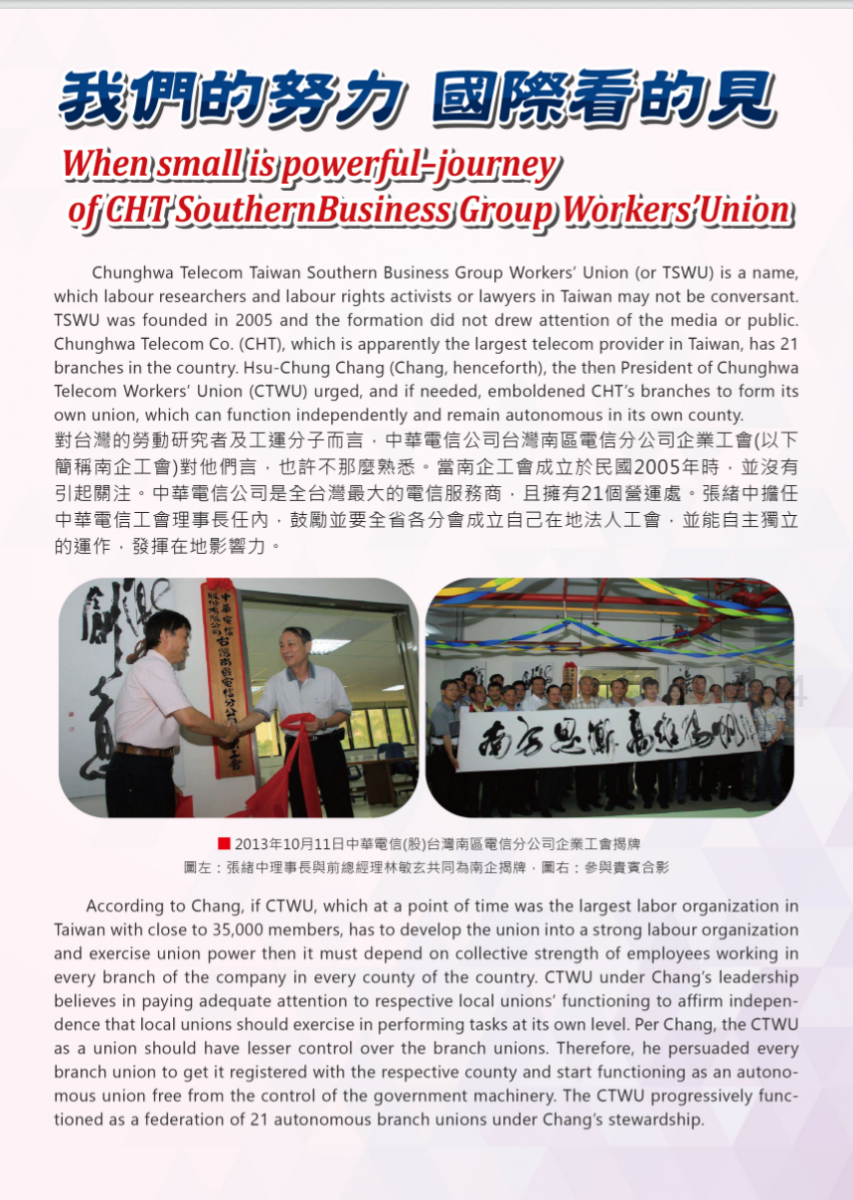
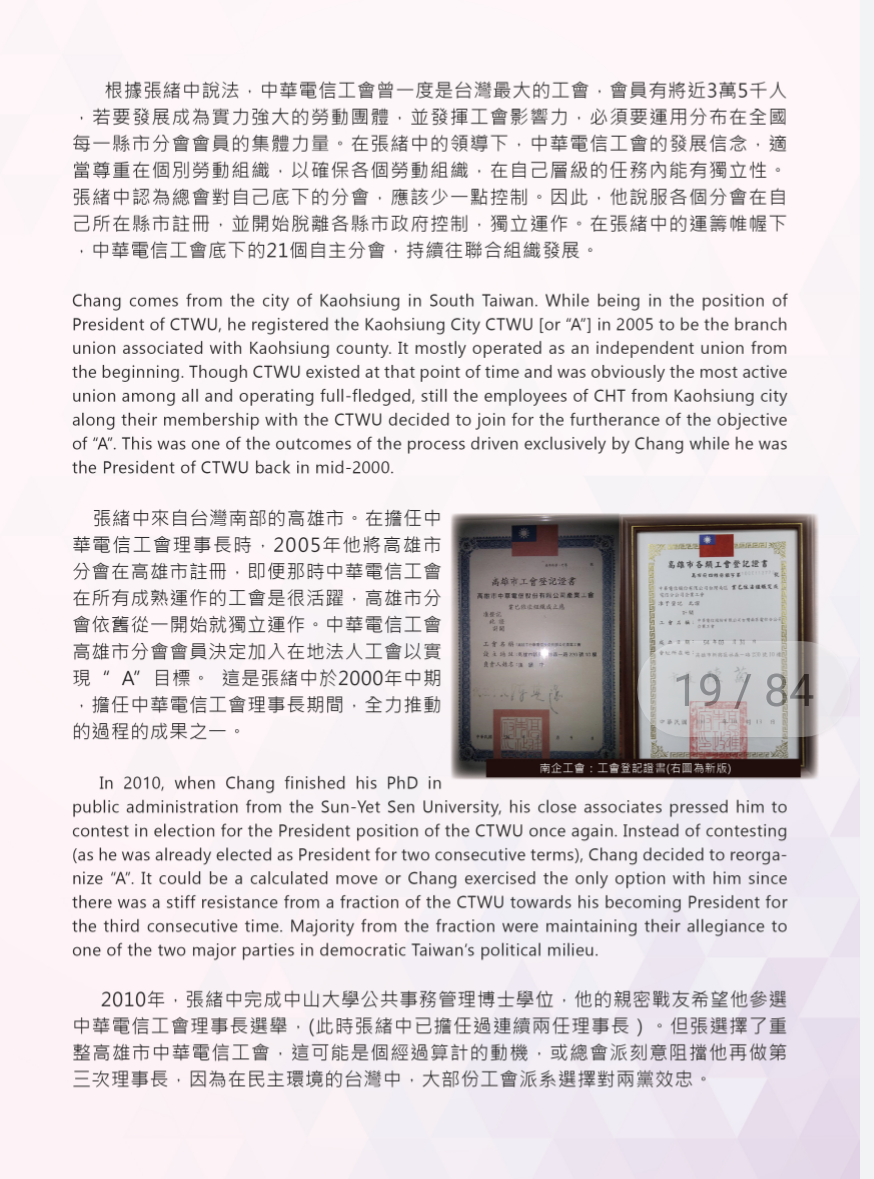
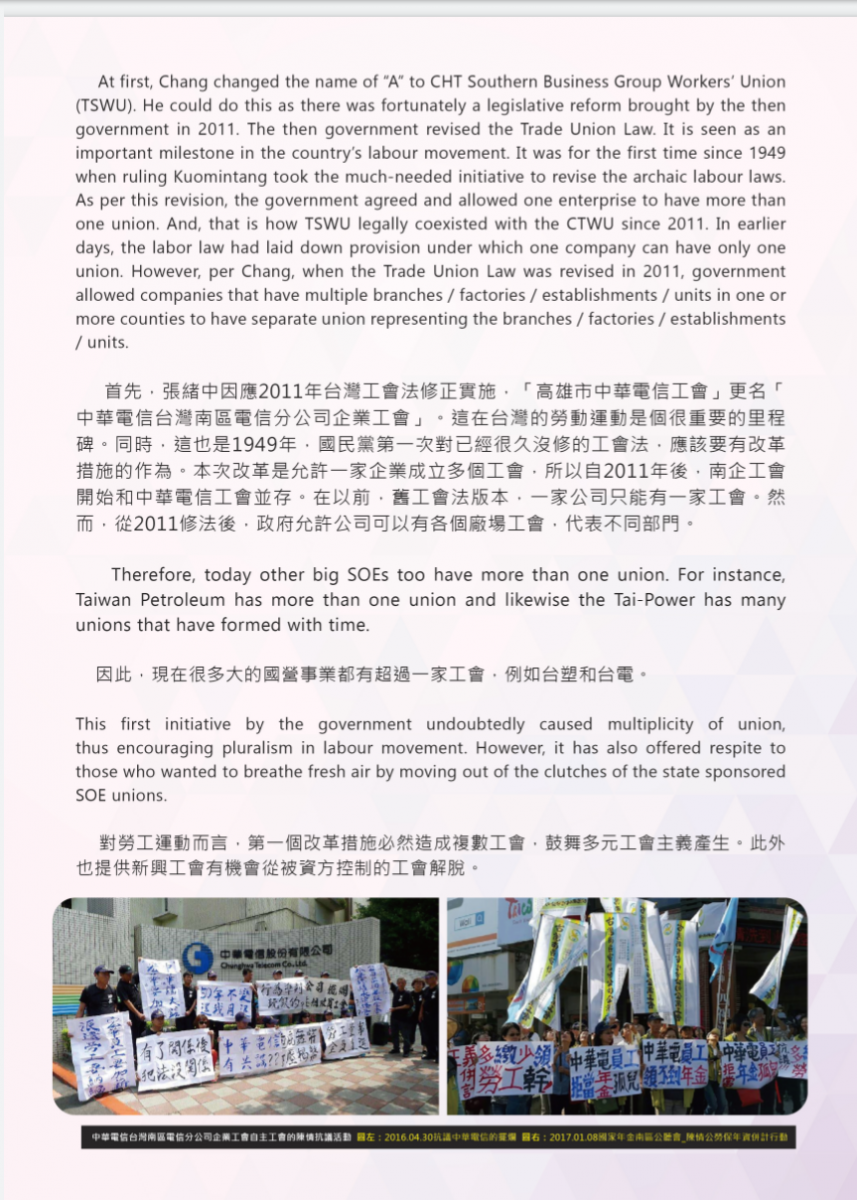
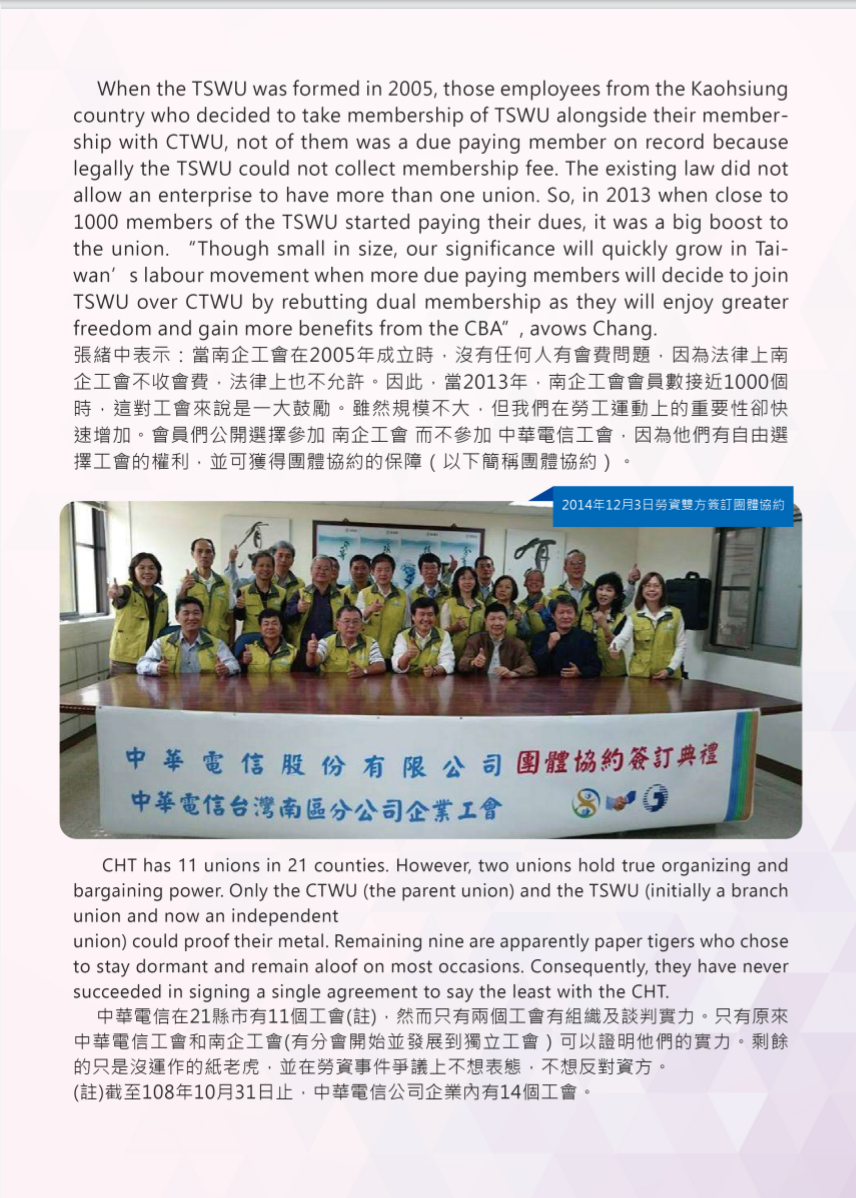
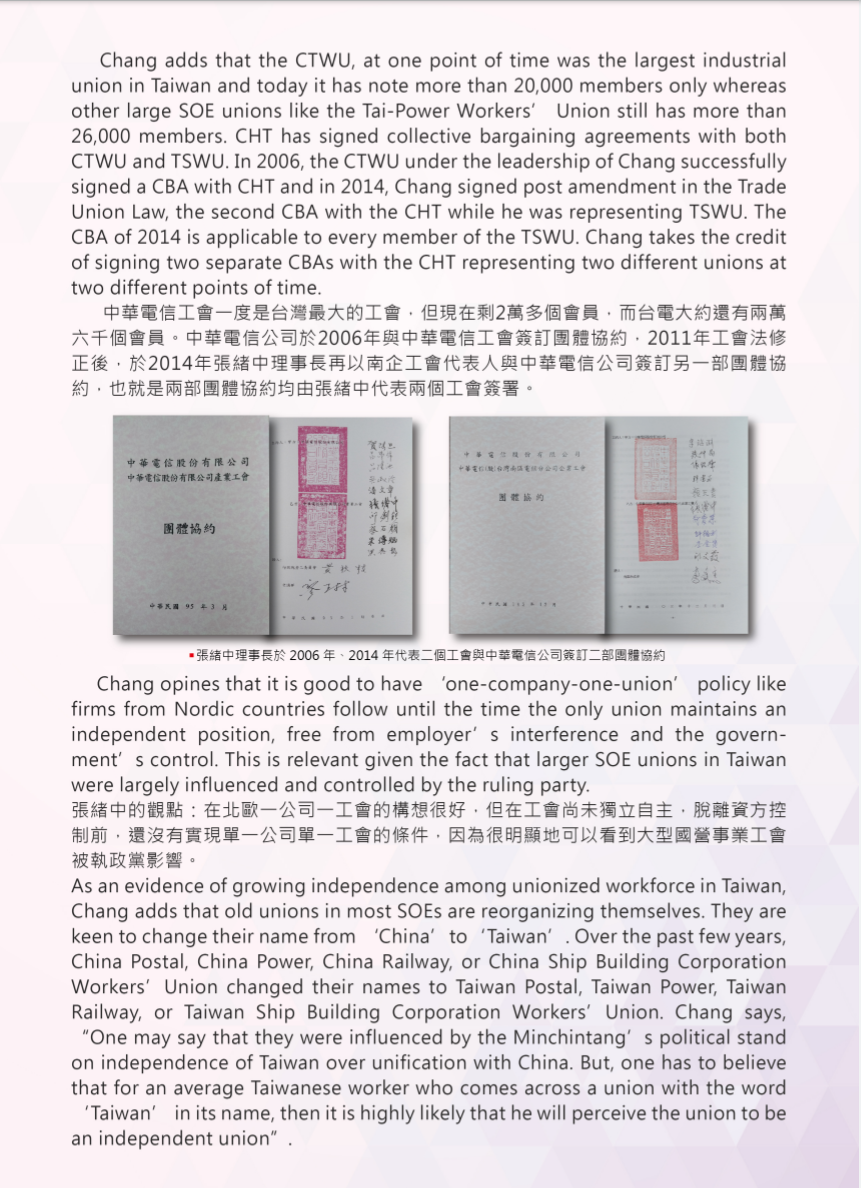
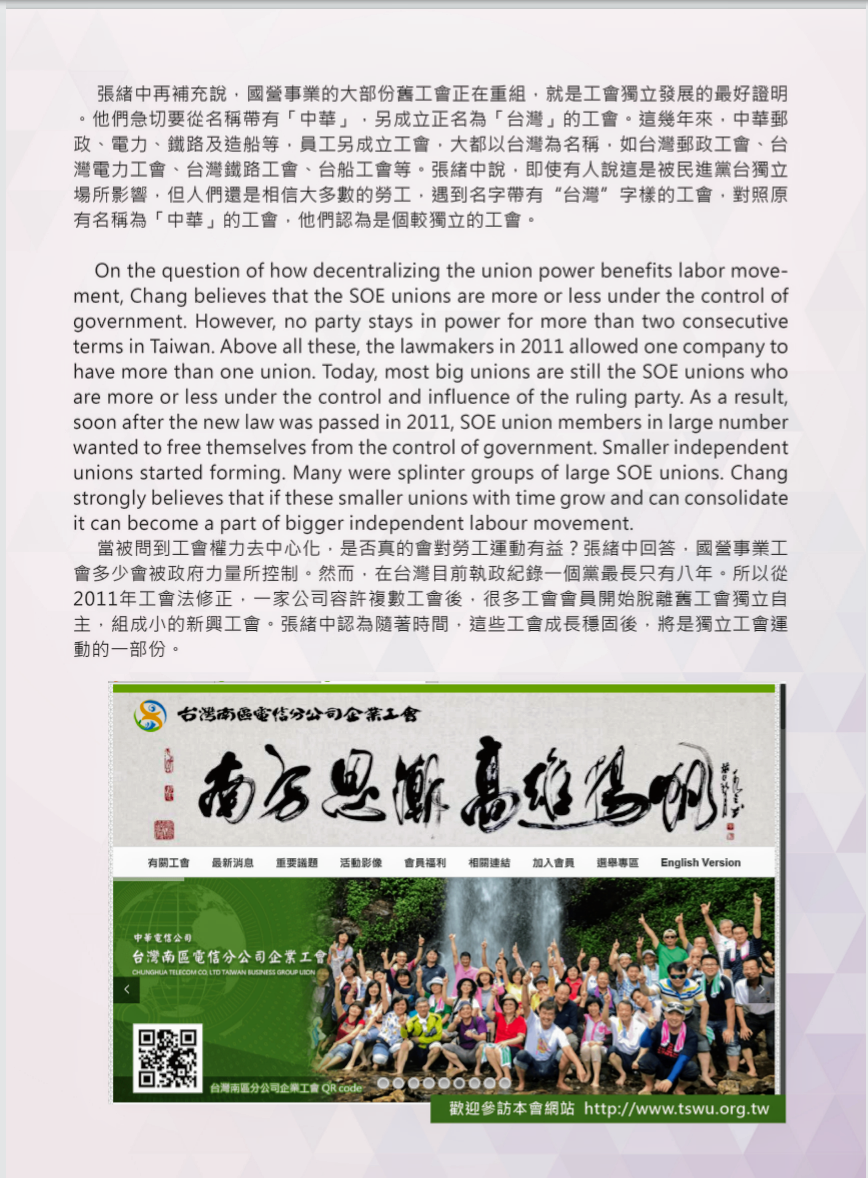
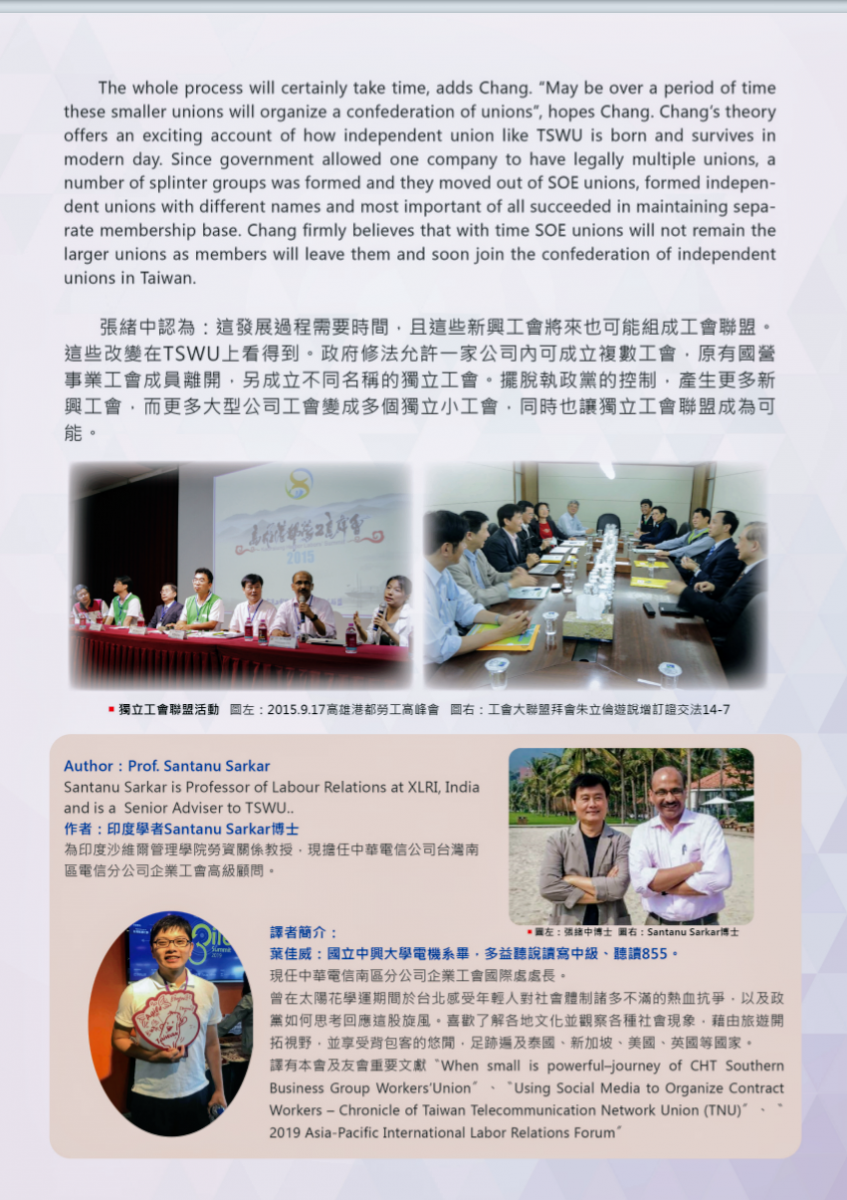
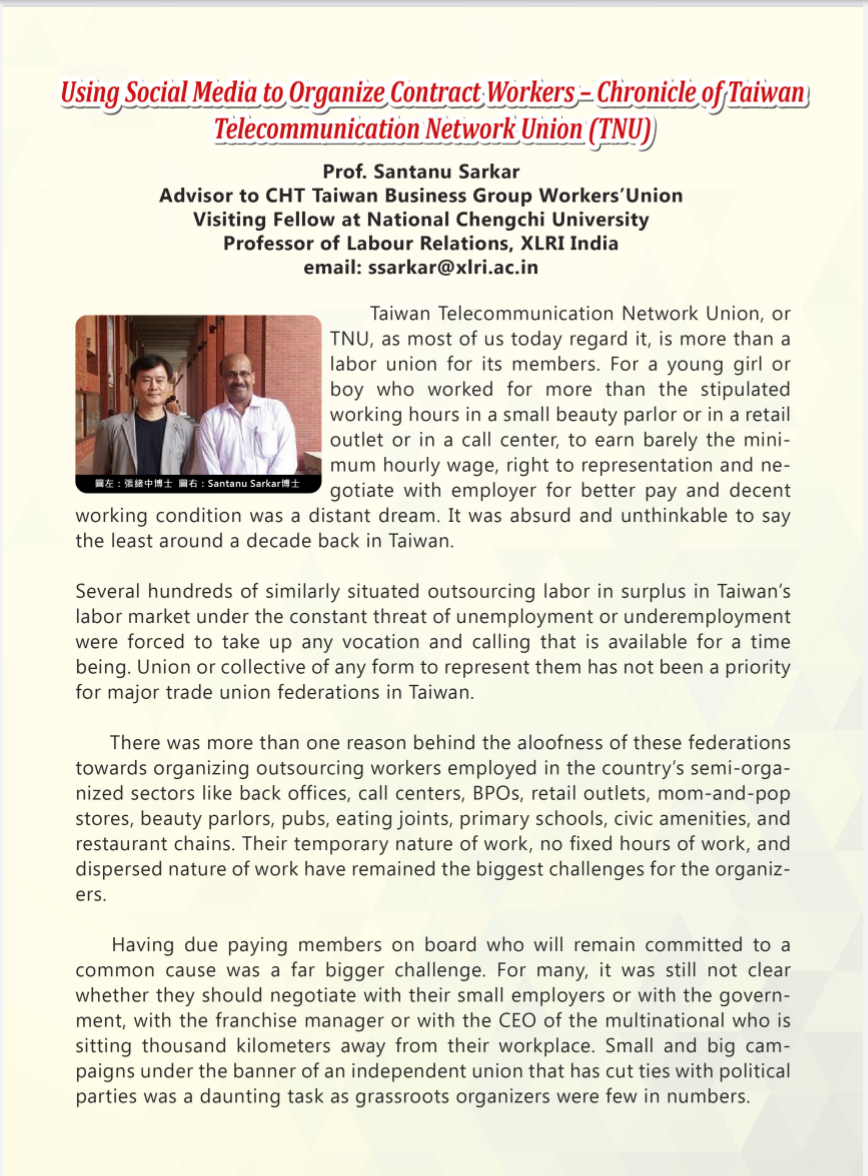
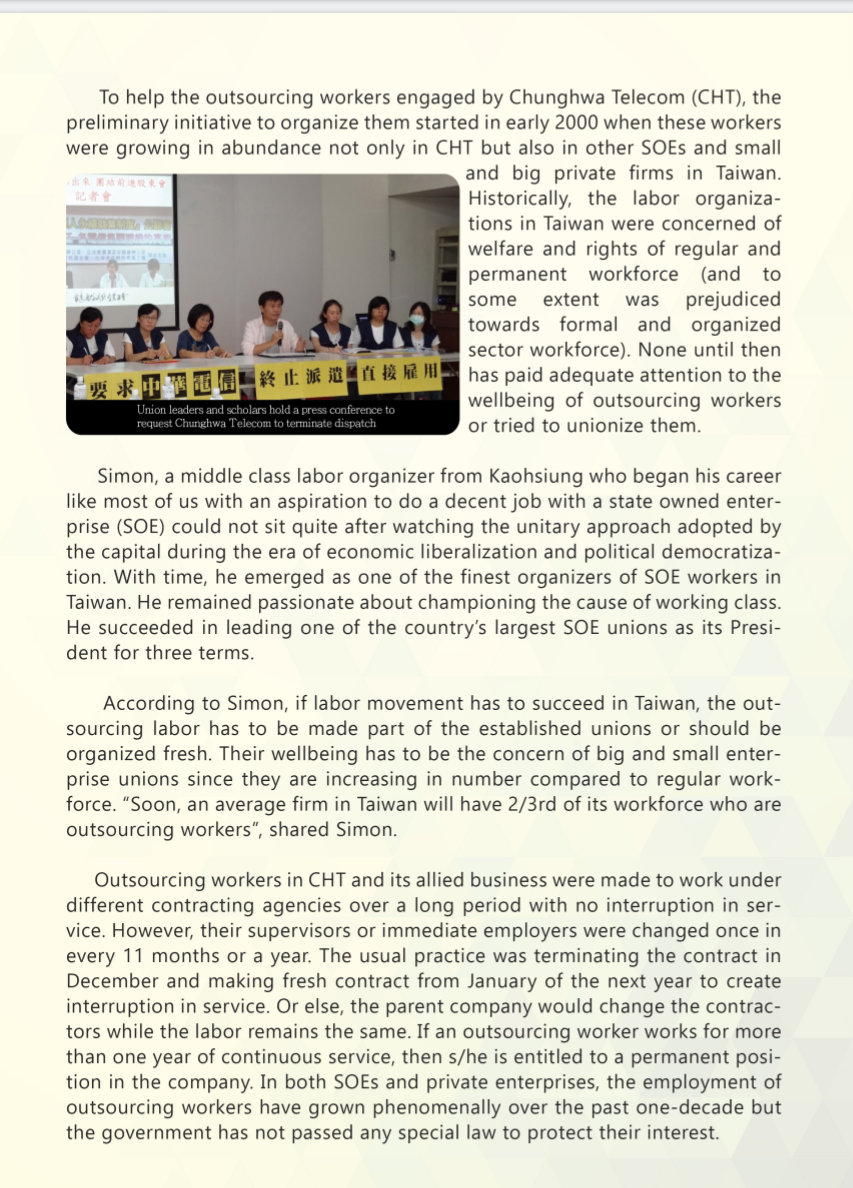
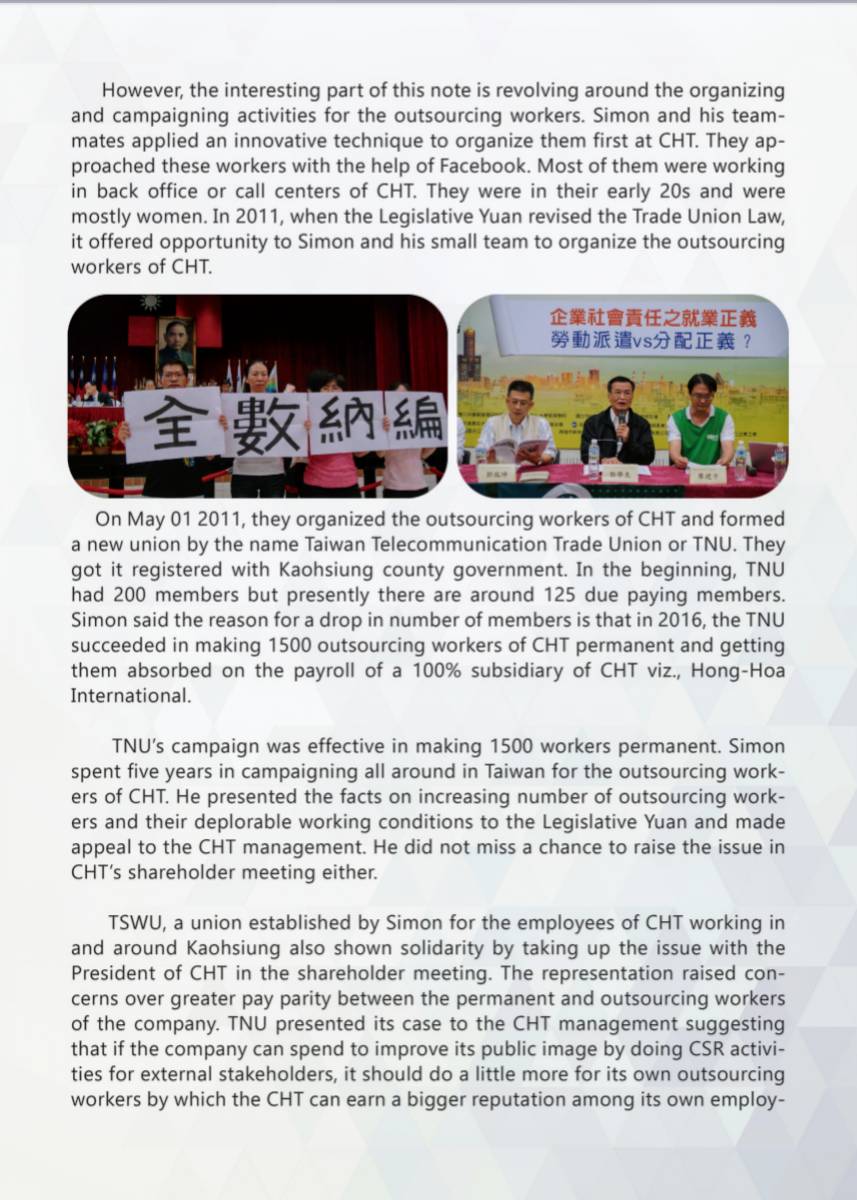
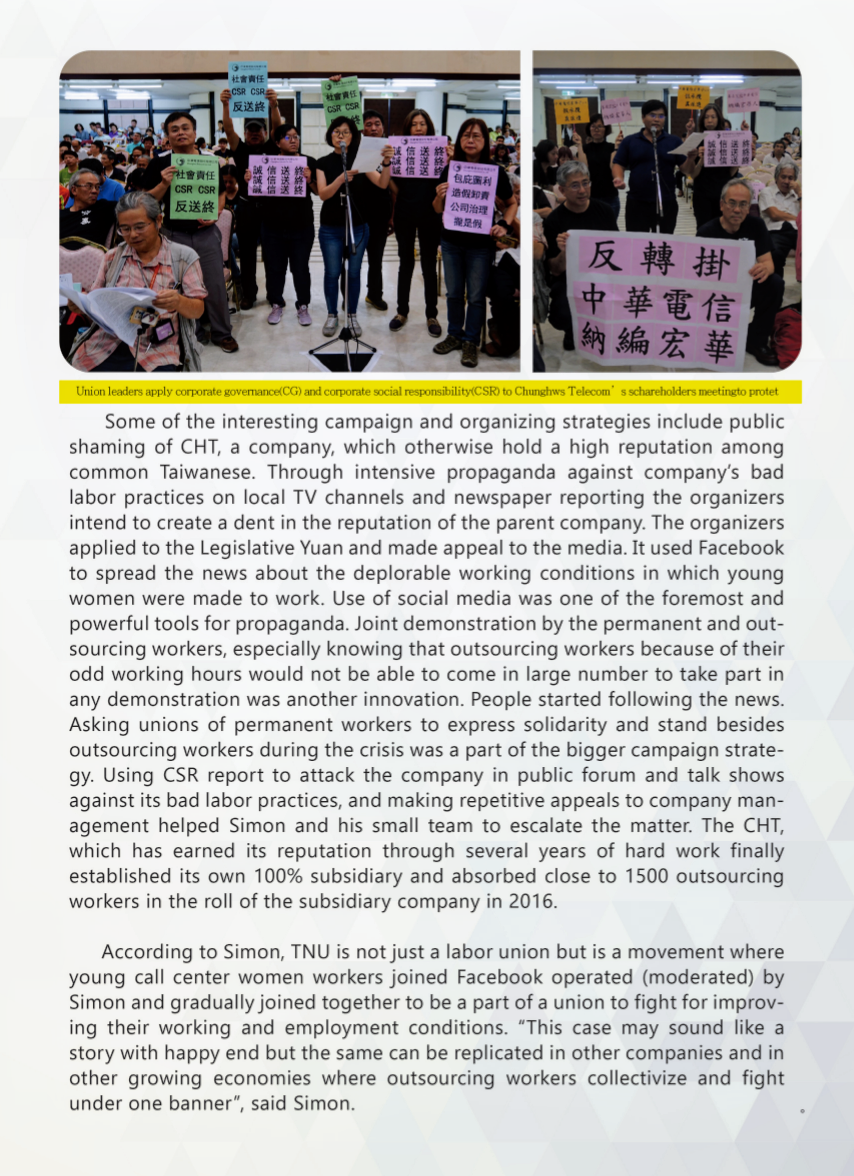
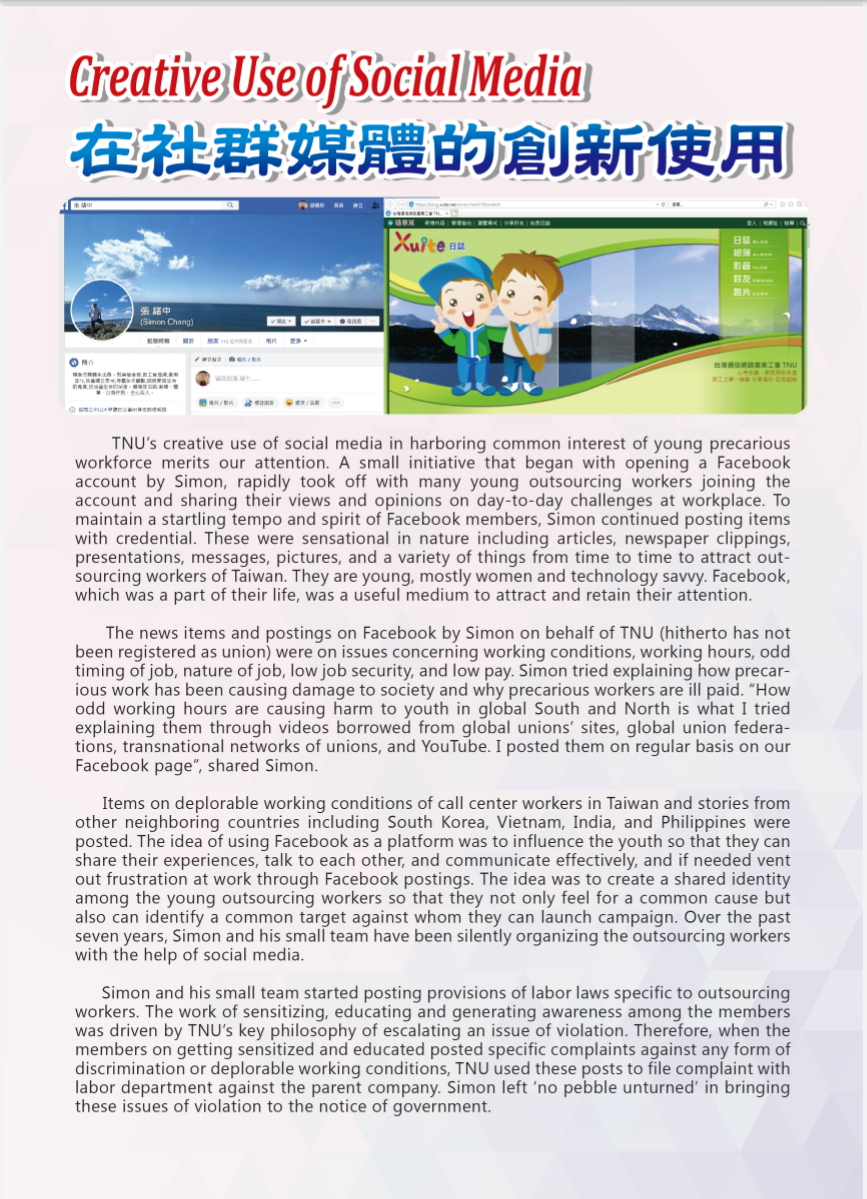
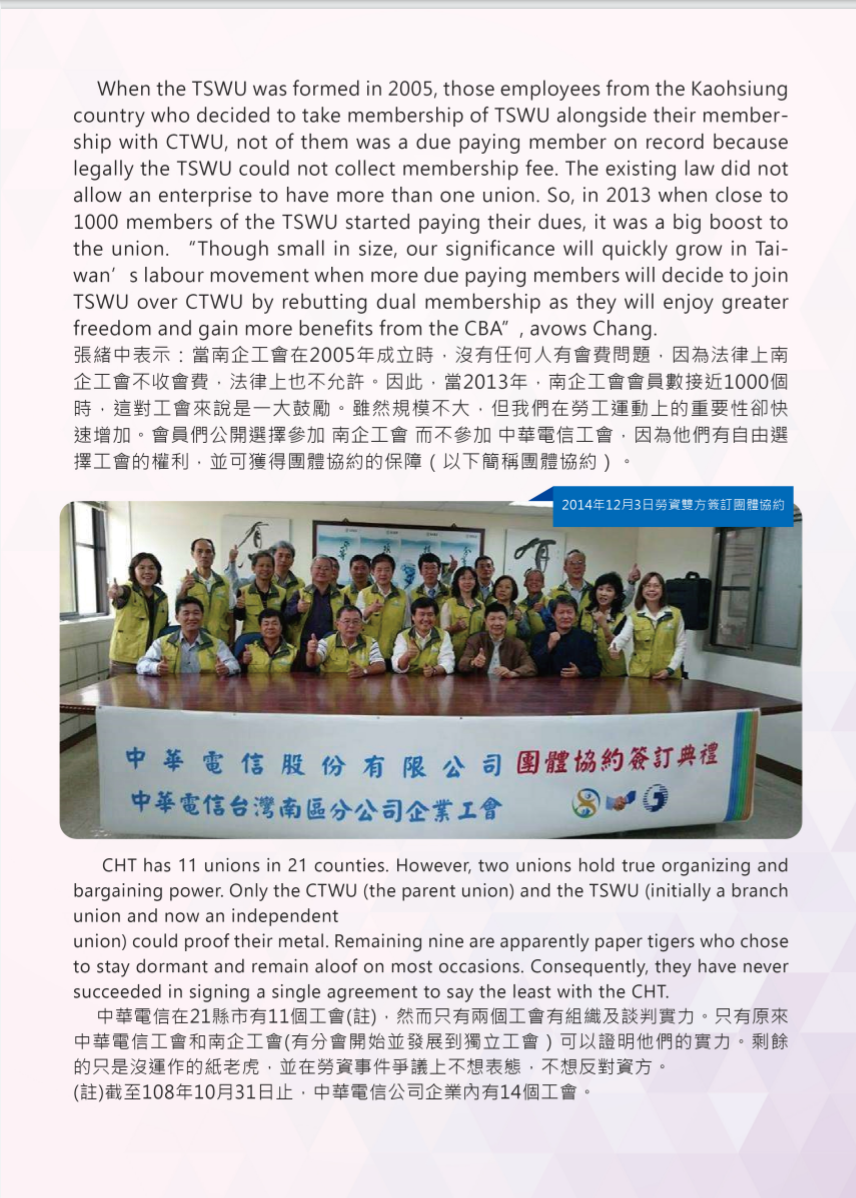
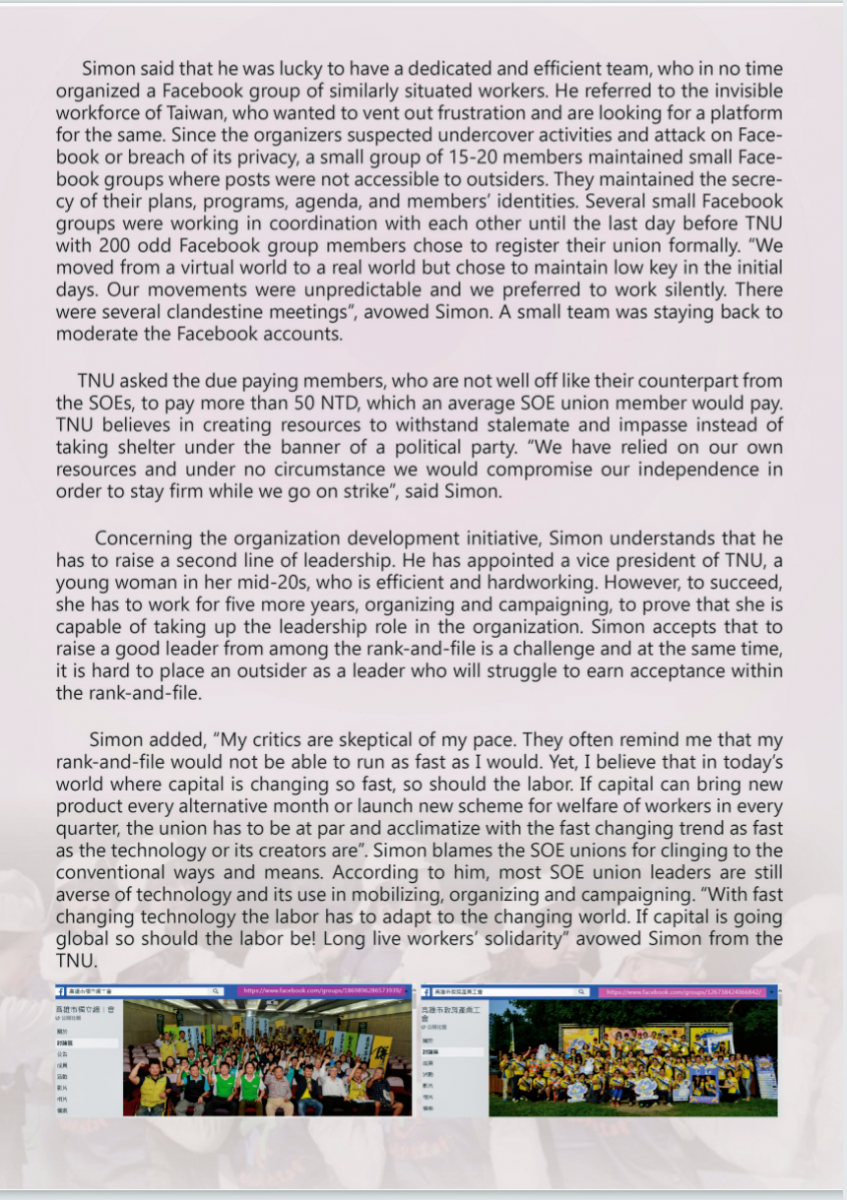
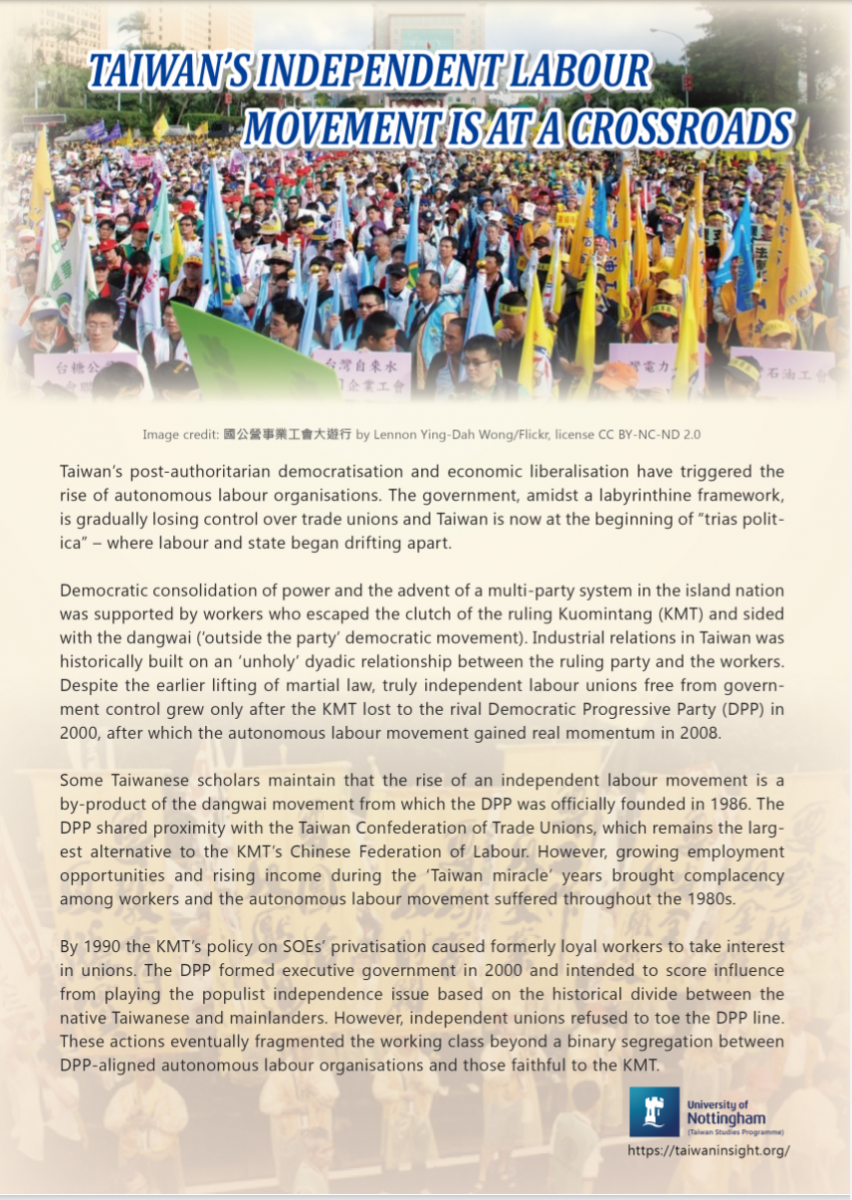
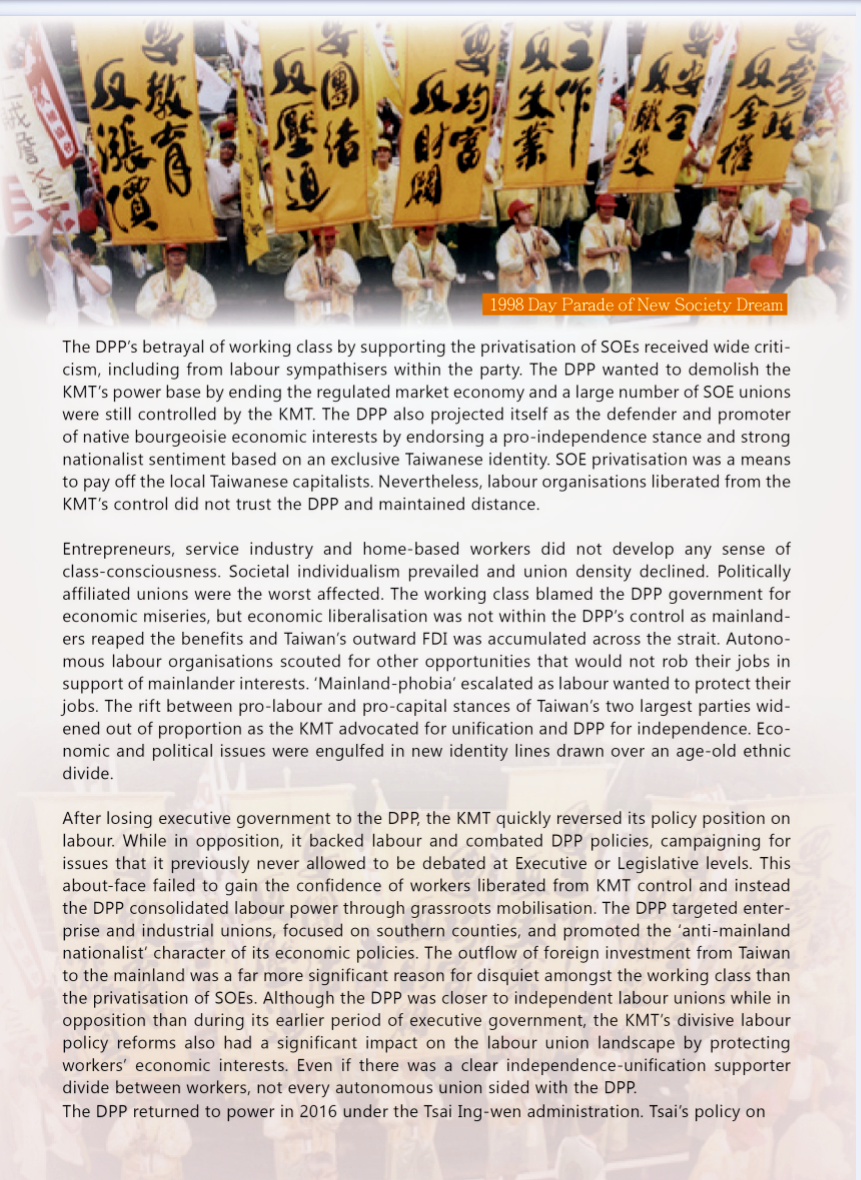
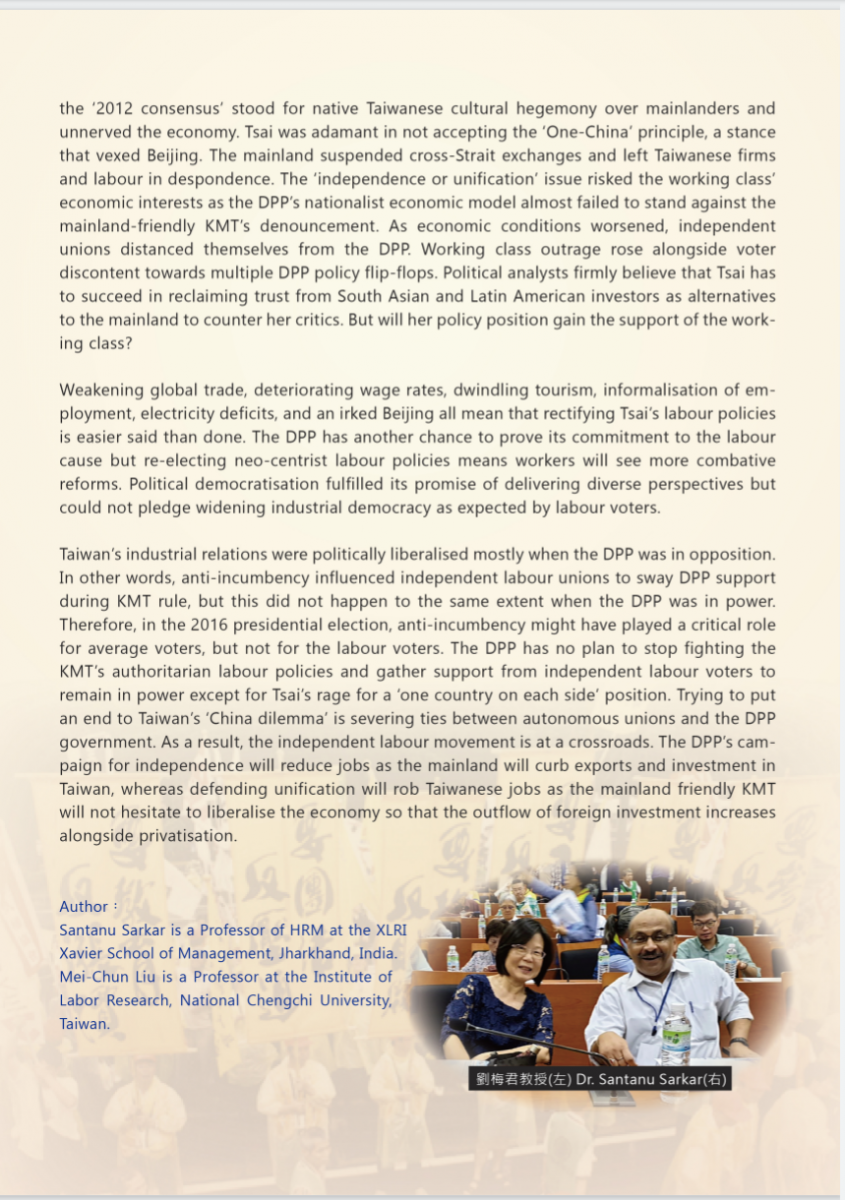
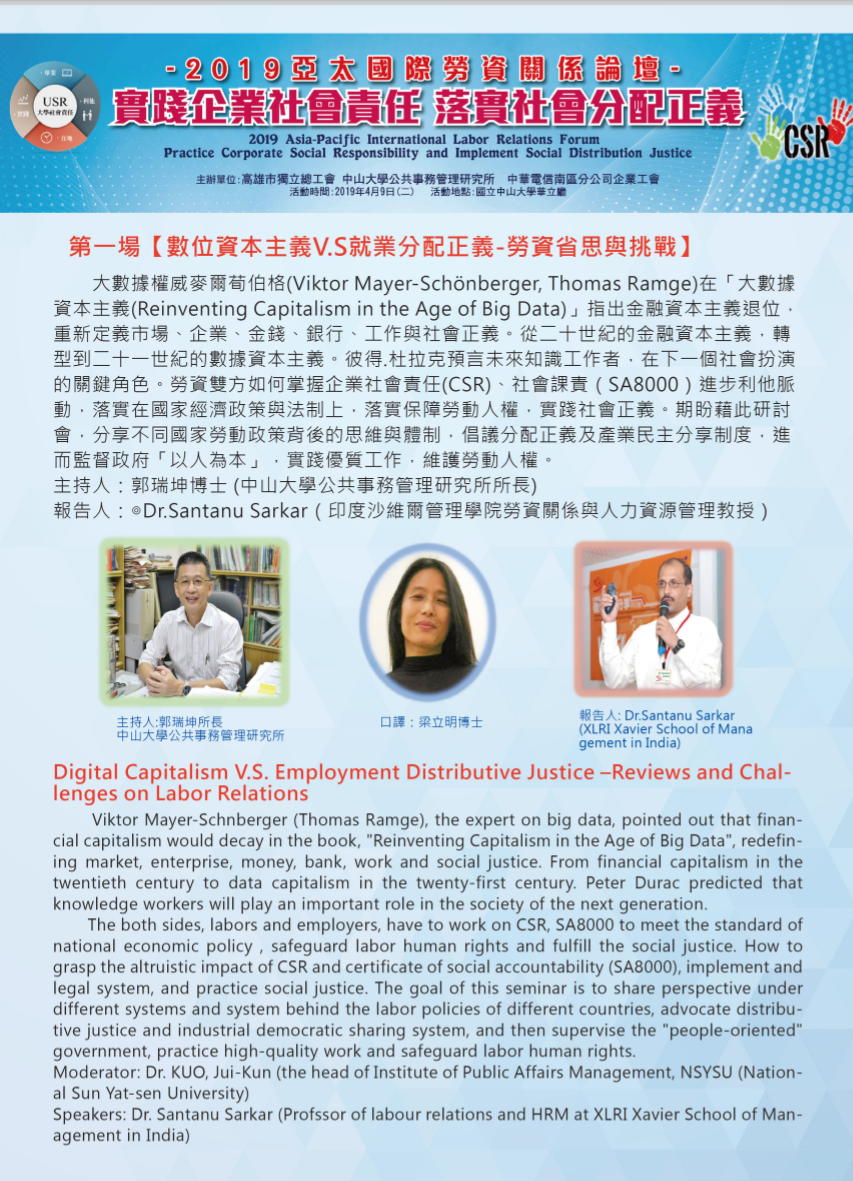
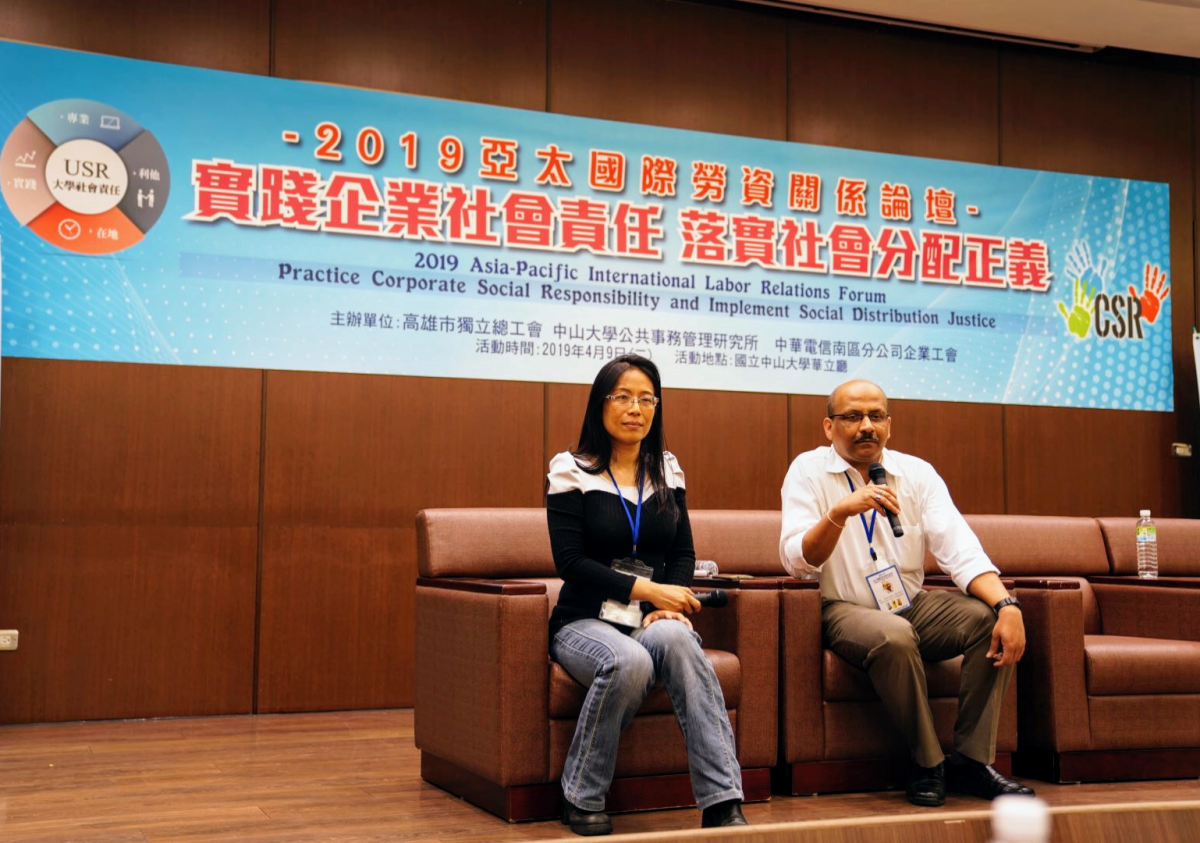
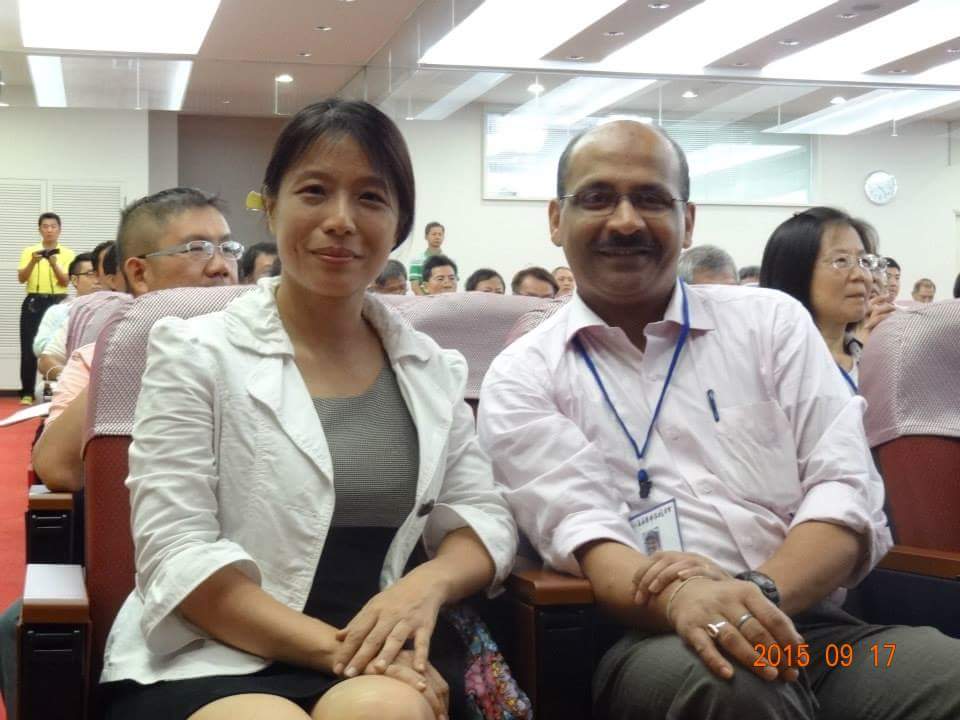
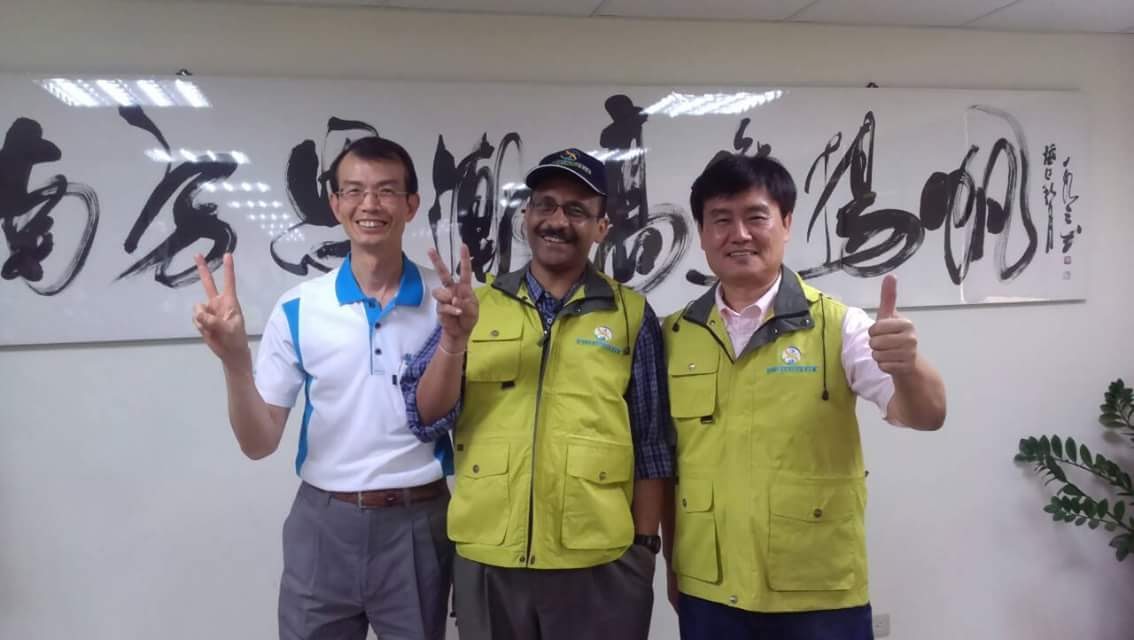
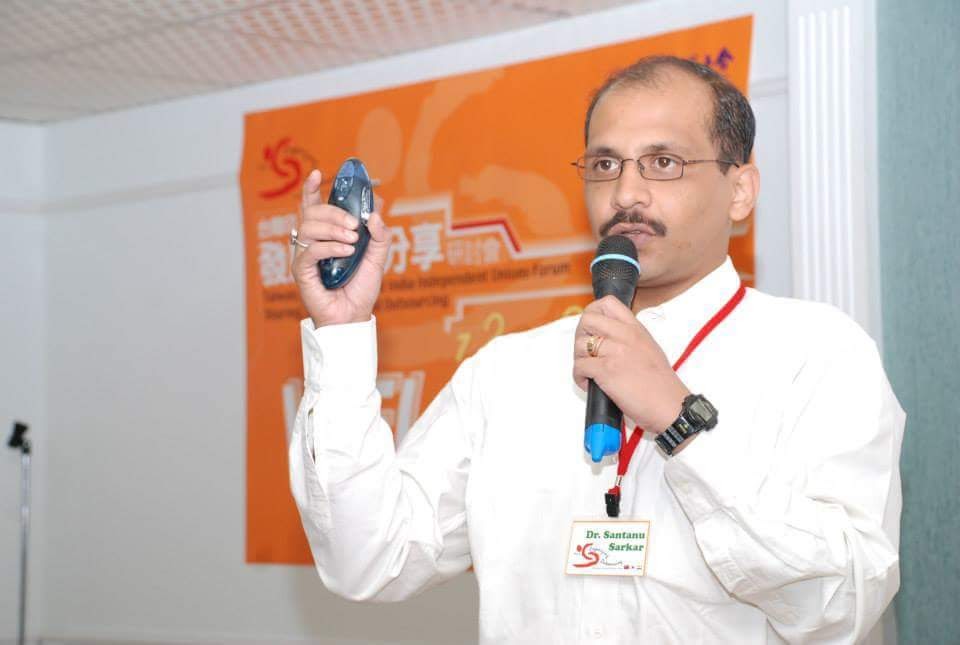
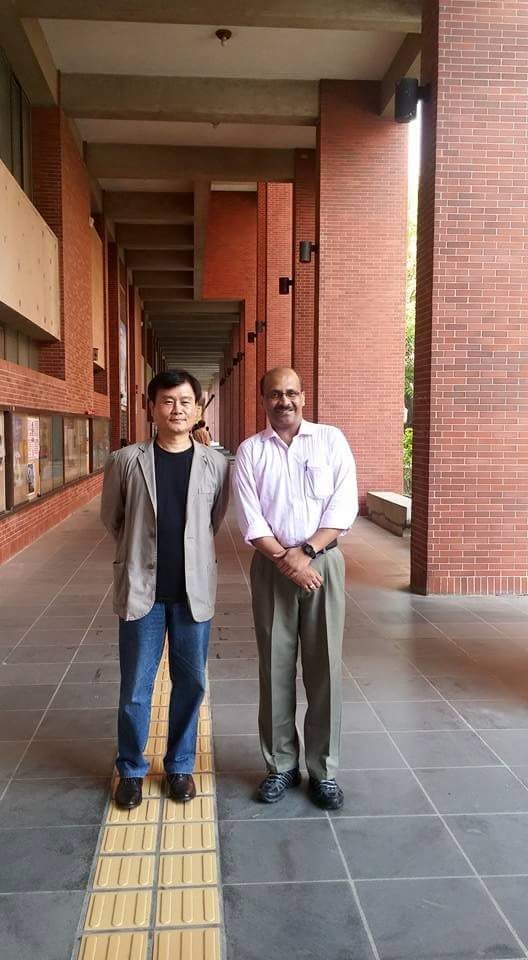
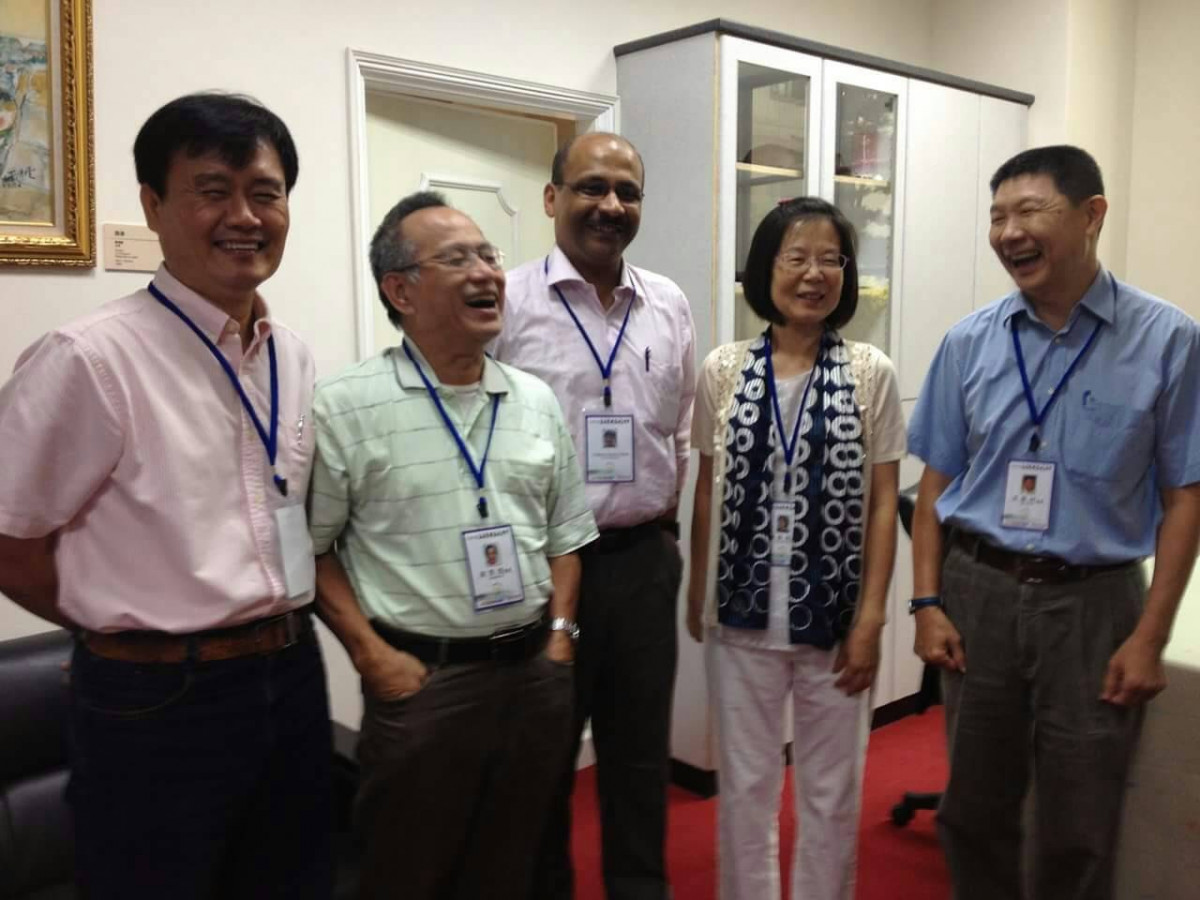
Kaohsiung Independent Federation Union Press Release: Commemorating the 40th Anniversary of the Formosa Incident
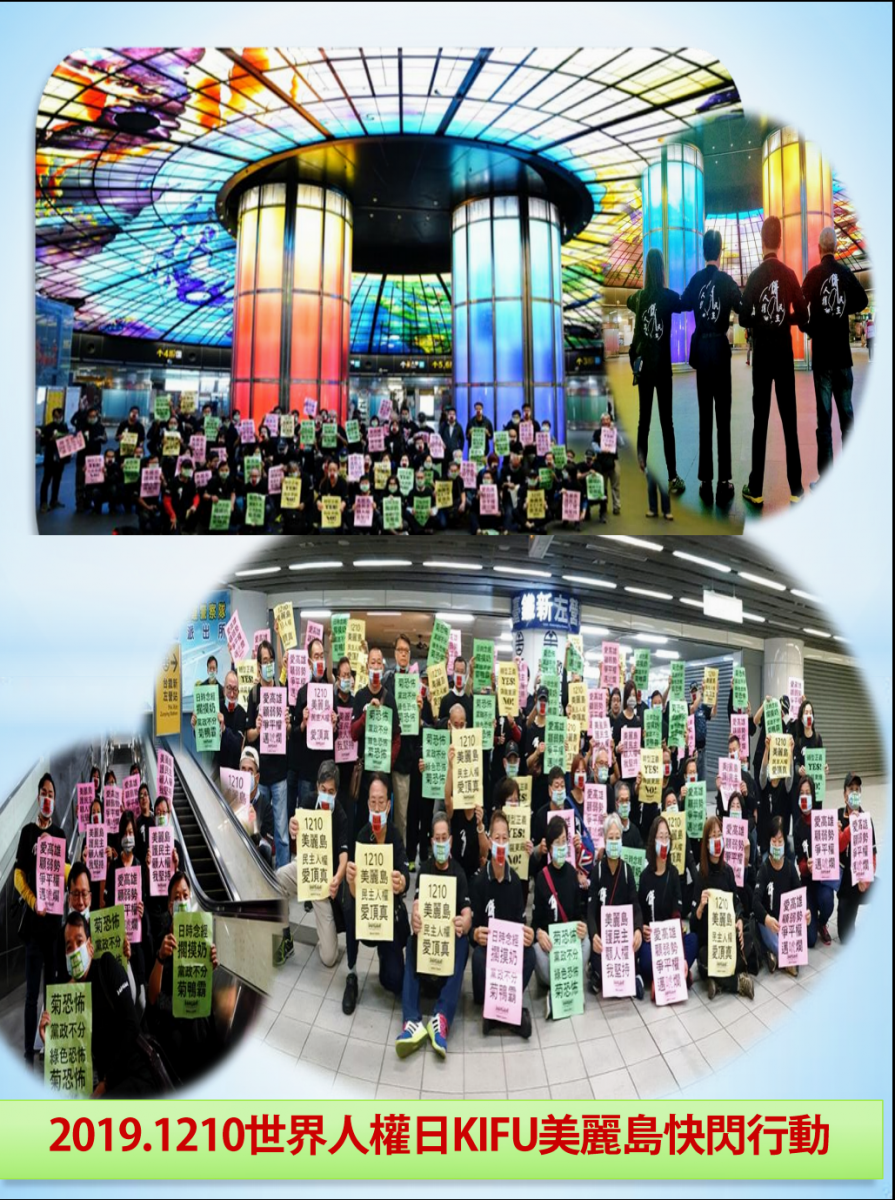
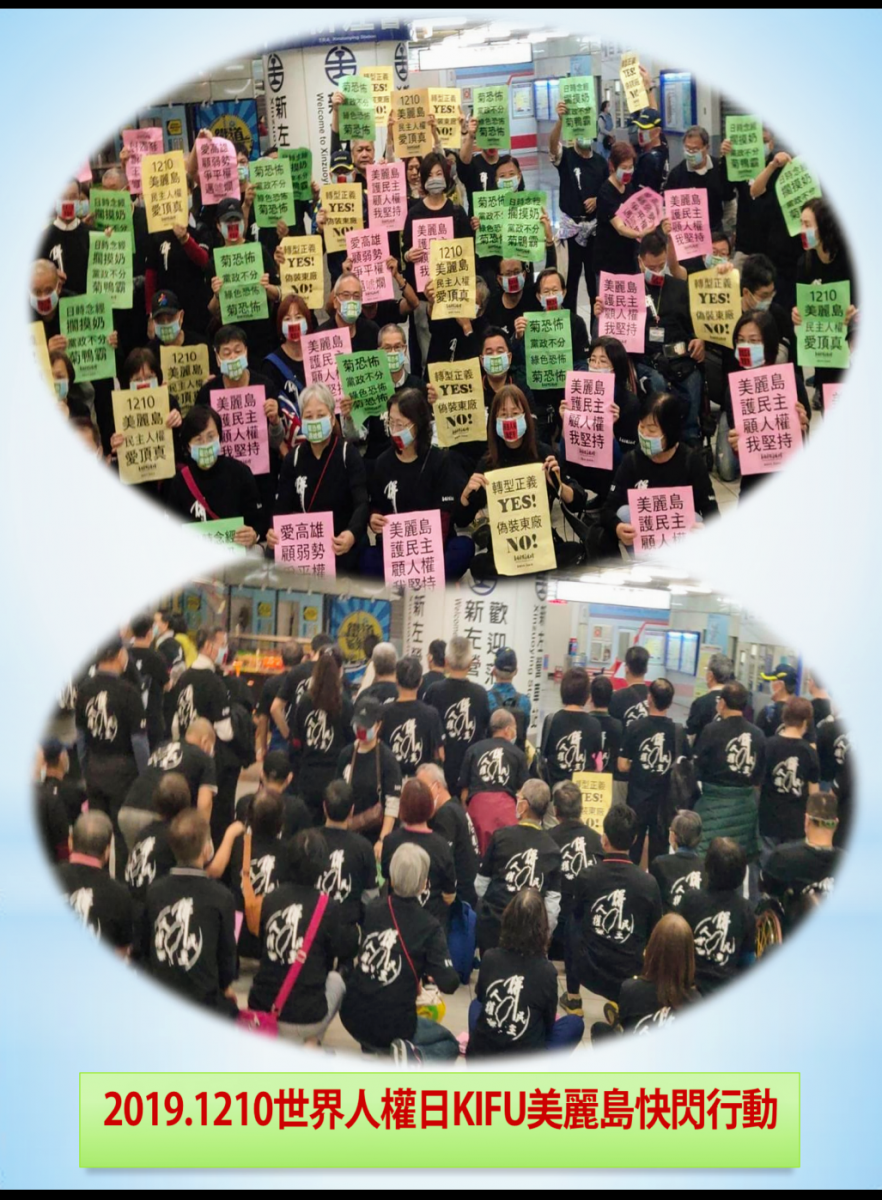
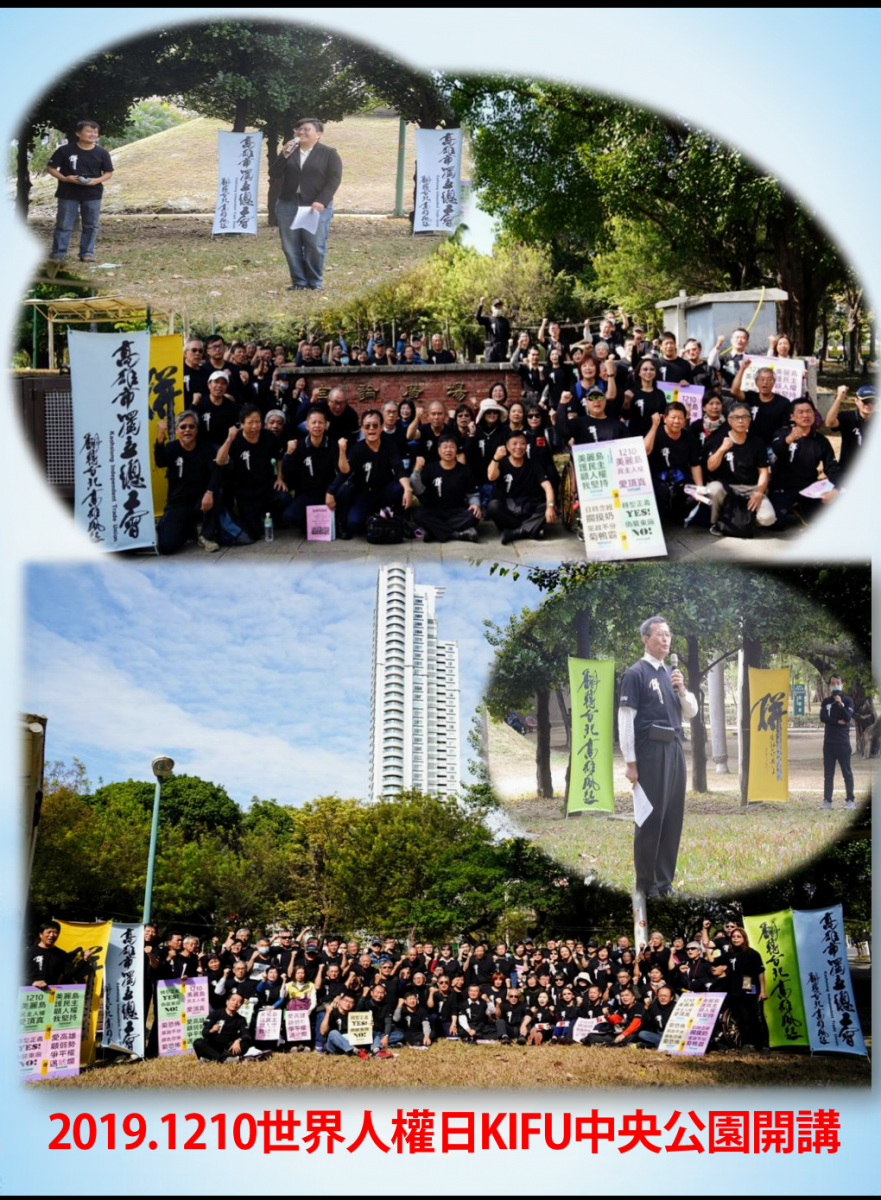
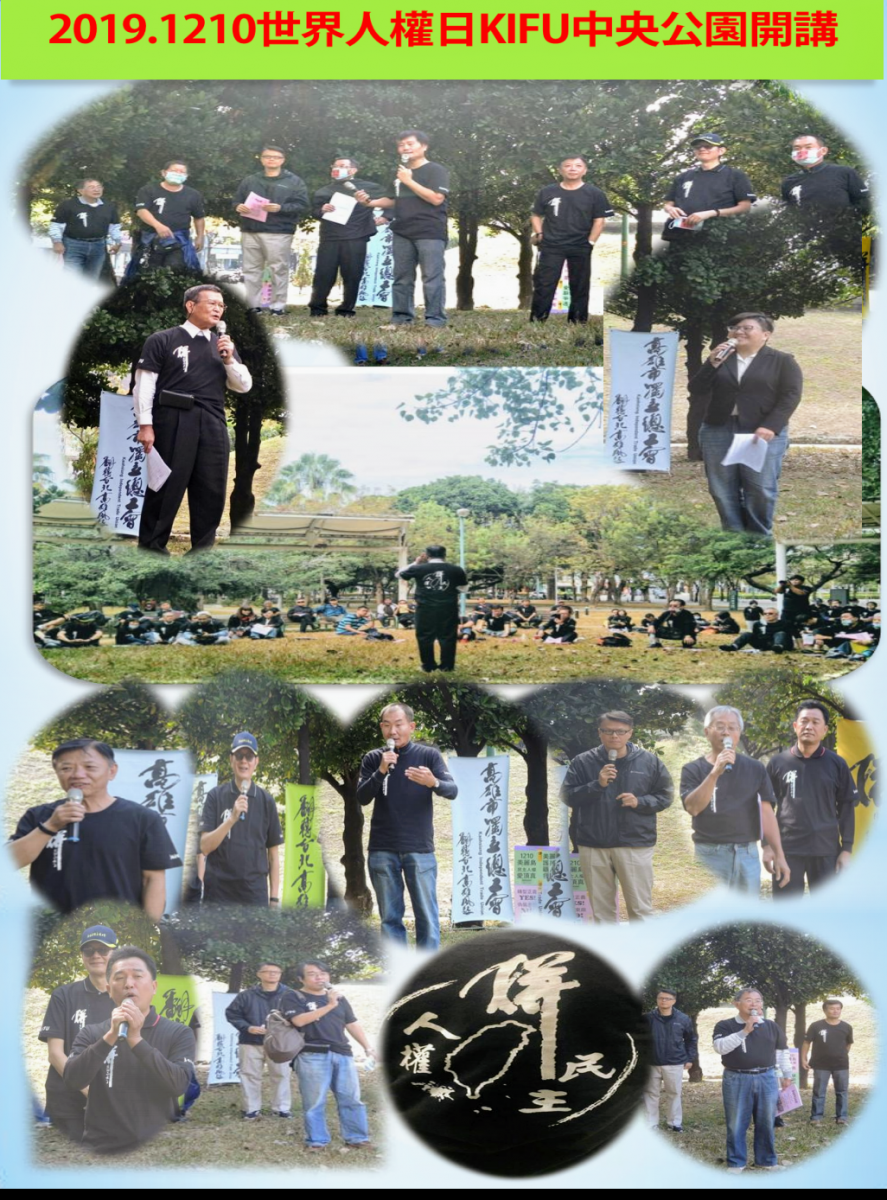 The Kaohsiung Independent Federation of Trade Unions pointed out: The 1210 World Human Rights Day and the 40th anniversary of Beautiful Island, Kaohsiung Independent Federation of Trade Unions miss Taiwan ’s democratic predecessors, pursue the courage and dedication of democratic human rights, deepen democratic human rights literacy, and promote work-oriented justice, a special choice In 1210, a lecture was held at Kaohsiung Central Park Speech Plaza to conduct labor rights transformation education.
The Kaohsiung Independent Federation of Trade Unions pointed out: The 1210 World Human Rights Day and the 40th anniversary of Beautiful Island, Kaohsiung Independent Federation of Trade Unions miss Taiwan ’s democratic predecessors, pursue the courage and dedication of democratic human rights, deepen democratic human rights literacy, and promote work-oriented justice, a special choice In 1210, a lecture was held at Kaohsiung Central Park Speech Plaza to conduct labor rights transformation education.
Taiwan's Indepdenent Labour Movement is at a Crossroads

Taiwan’s post-authoritarian democratisation and economic liberalisation have triggered the rise of autonomous labour organisations. The government, amidst a labyrinthine framework, is gradually losing control over trade unions and Taiwan is now at the beginning of “trias politica” – where labour and state began drifting apart.
Democratic consolidation of power and the advent of a multi-party system in the island nation was supported by workers who escaped the clutch of the ruling Kuomintang (KMT) and sided with the dangwai (‘outside the party’ democratic movement). Industrial relations in Taiwan was historically built on an ‘unholy’ dyadic relationship between the ruling party and the workers. Despite the earlier lifting of martial law, truly independent labour unions free from government control grew only after the KMT lost to the rival Democratic Progressive Party (DPP) in 2000, after which the autonomous labour movement gained real momentum in 2008.
Some Taiwanese scholars maintain that the rise of an independent labour movement is a by-product of the dangwai movement from which the DPP was officially founded in 1986. The DPP shared proximity with the Taiwan Confederation of Trade Unions, which remains the largest alternative to the KMT’s Chinese Federation of Labour. However, growing employment opportunities and rising income during the ‘Taiwan miracle’ years brought complacency among workers and the autonomous labour movement suffered throughout the 1980s.
By 1990 the KMT’s policy on SOEs’ privatisation caused formerly loyal workers to take interest in unions. The DPP formed executive government in 2000 and intended to score influence from playing the populist independence issue based on the historical divide between the native Taiwanese and mainlanders. However, independent unions refused to toe the DPP line. These actions eventually fragmented the working class beyond a binary segregation between DPP-aligned autonomous labour organisations and those faithful to the KMT.
The DPP’s betrayal of working class by supporting the privatisation of SOEs received wide criticism, including from labour sympathisers within the party. The DPP wanted to demolish the KMT’s power base by ending the regulated market economy and a large number of SOE unions were still controlled by the KMT. The DPP also projected itself as the defender and promoter of native bourgeoisie economic interests by endorsing a pro-independence stance and strong nationalist sentiment based on an exclusive Taiwanese identity. SOE privatisation was a means to pay off the local Taiwanese capitalists. Nevertheless, labour organisations liberated from the KMT’s control did not trust the DPP and maintained distance.
Entrepreneurs, service industry and home-based workers did not develop any sense of class-consciousness. Societal individualism prevailed and union density declined. Politically affiliated unions were the worst affected. The working class blamed the DPP government for economic miseries, but economic liberalisation was not within the DPP’s control as mainlanders reaped the benefits and Taiwan’s outward FDI was accumulated across the strait. Autonomous labour organisations scouted for other opportunities that would not rob their jobs in support of mainlander interests. ‘Mainland-phobia’ escalated as labour wanted to protect their jobs. The rift between pro-labour and pro-capital stances of Taiwan’s two largest parties widened out of proportion as the KMT advocated for unification and DPP for independence. Economic and political issues were engulfed in new identity lines drawn over an age-old ethnic divide.
After losing executive government to the DPP, the KMT quickly reversed its policy position on labour. While in opposition, it backed labour and combated DPP policies, campaigning for issues that it previously never allowed to be debated at Executive or Legislative levels. This about-face failed to gain the confidence of workers liberated from KMT control and instead the DPP consolidated labour power through grassroots mobilisation. The DPP targeted enterprise and industrial unions, focused on southern counties, and promoted the ‘anti-mainland nationalist’ character of its economic policies. The outflow of foreign investment from Taiwan to the mainland was a far more significant reason for disquiet amongst the working class than the privatisation of SOEs. Although the DPP was closer to independent labour unions while in opposition than during its earlier period of executive government, the KMT’s divisive labour policy reforms also had a significant impact on the labour union landscape by protecting workers’ economic interests. Even if there was a clear independence-unification supporter divide between workers, not every autonomous union sided with the DPP.
The DPP returned to power in 2016 under the Tsai Ing-wen administration. Tsai’s policy on the ‘2012 consensus’ stood for native Taiwanese cultural hegemony over mainlanders and unnerved the economy. Tsai was adamant in not accepting the ‘One-China’ principle, a stance that vexed Beijing. The mainland suspended cross-Strait exchanges and left Taiwanese firms and labour in despondence. The ‘independence or unification’ issue risked the working class’ economic interests as the DPP’s nationalist economic model almost failed to stand against the mainland-friendly KMT’s denouncement. As economic conditions worsened, independent unions distanced themselves from the DPP. Working class outrage rose alongside voter discontent towards multiple DPP policy flip-flops. Political analysts firmly believe that Tsai has to succeed in reclaiming trust from South Asian and Latin American investors as alternatives to the mainland to counter her critics. But will her policy position gain the support of the working class?
Weakening global trade, deteriorating wage rates, dwindling tourism, informalisation of employment, electricity deficits, and an irked Beijing all mean that rectifying Tsai’s labour policies is easier said than done. The DPP has another chance to prove its commitment to the labour cause but re-electing neo-centrist labour policies means workers will see more combative reforms. Political democratisation fulfilled its promise of delivering diverse perspectives but could not pledge widening industrial democracy as expected by labour voters.
Taiwan’s industrial relations were politically liberalised mostly when the DPP was in opposition. In other words, anti-incumbency influenced independent labour unions to sway DPP support during KMT rule, but this did not happen to the same extent when the DPP was in power. Therefore, in the 2016 presidential election, anti-incumbency might have played a critical role for average voters, but not for the labour voters. The DPP has no plan to stop fighting the KMT’s authoritarian labour policies and gather support from independent labour voters to remain in power except for Tsai’s rage for a ‘one country on each side’ position. Trying to put an end to Taiwan’s ‘China dilemma’ is severing ties between autonomous unions and the DPP government. As a result, the independent labour movement is at a crossroads. The DPP’s campaign for independence will reduce jobs as the mainland will curb exports and investment in Taiwan, whereas defending unification will rob Taiwanese jobs as the mainland friendly KMT will not hesitate to liberalise the economy so that the outflow of foreign investment increases alongside privatisation
